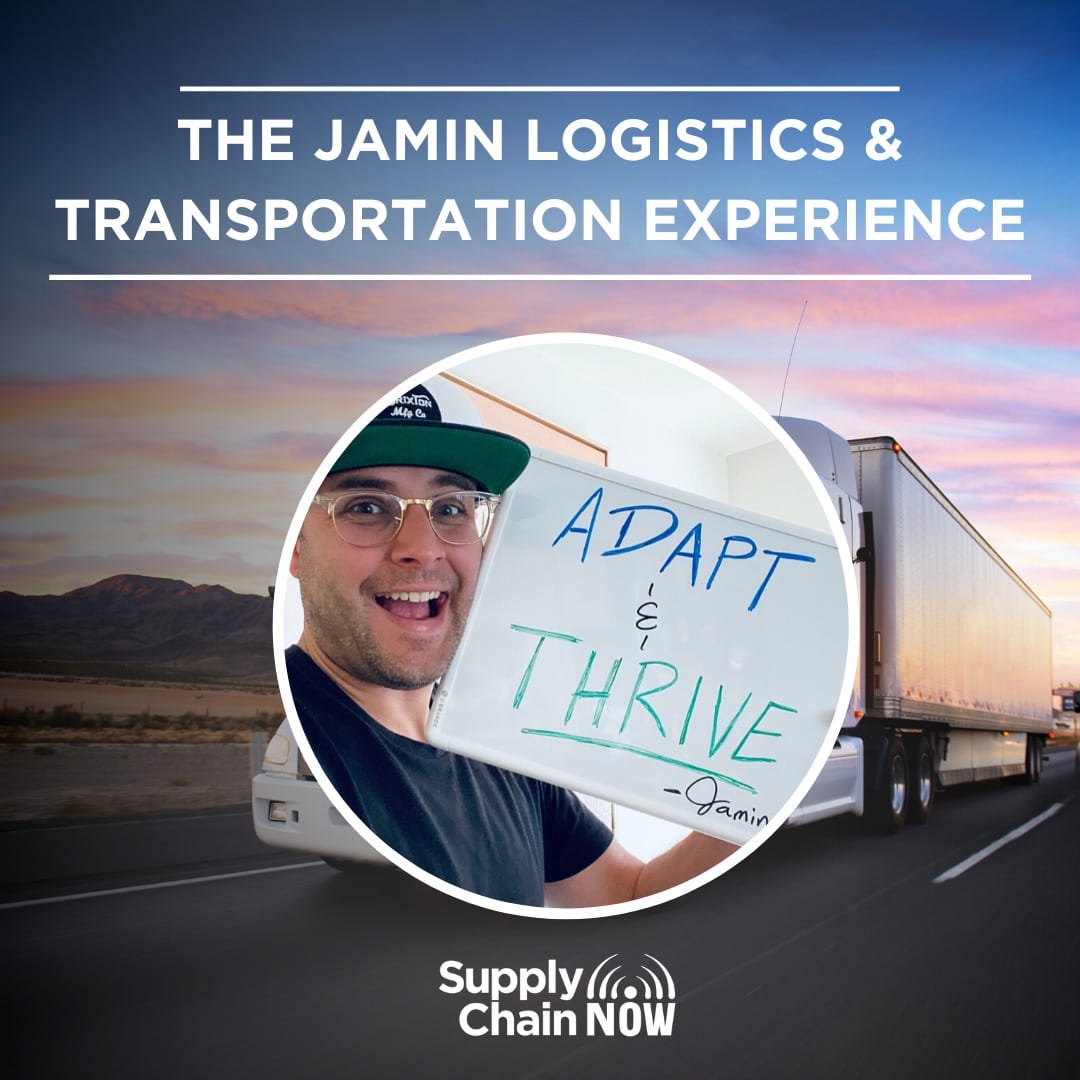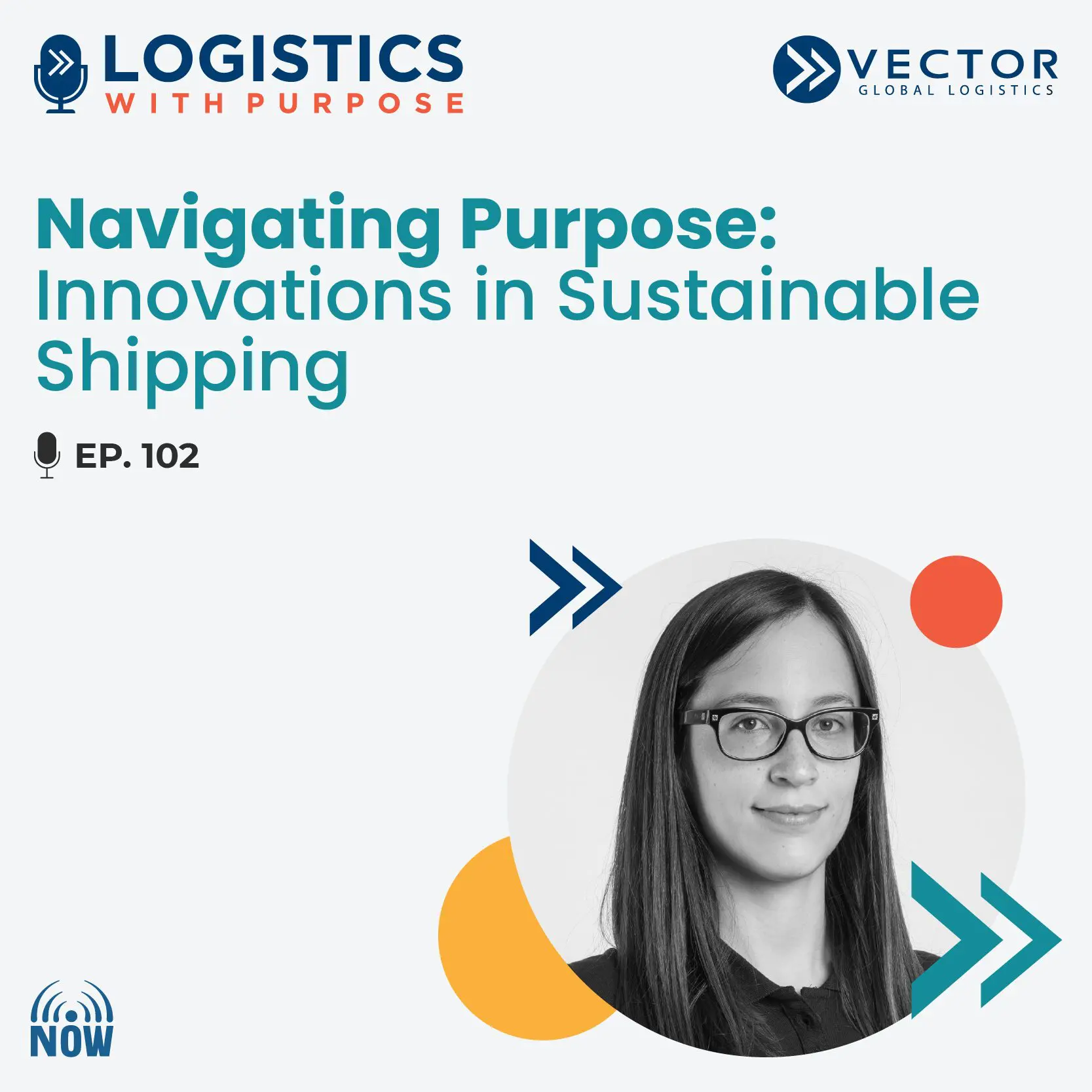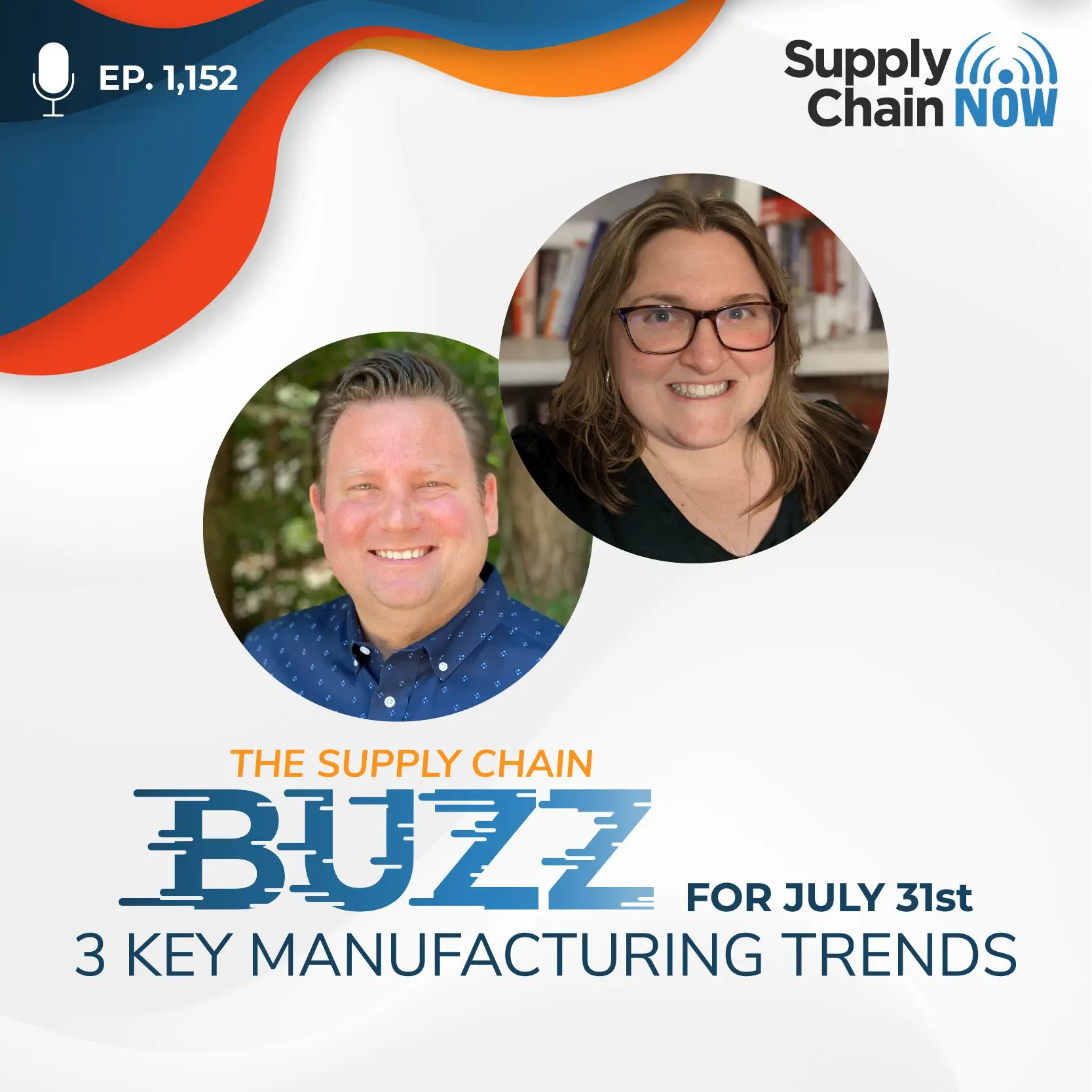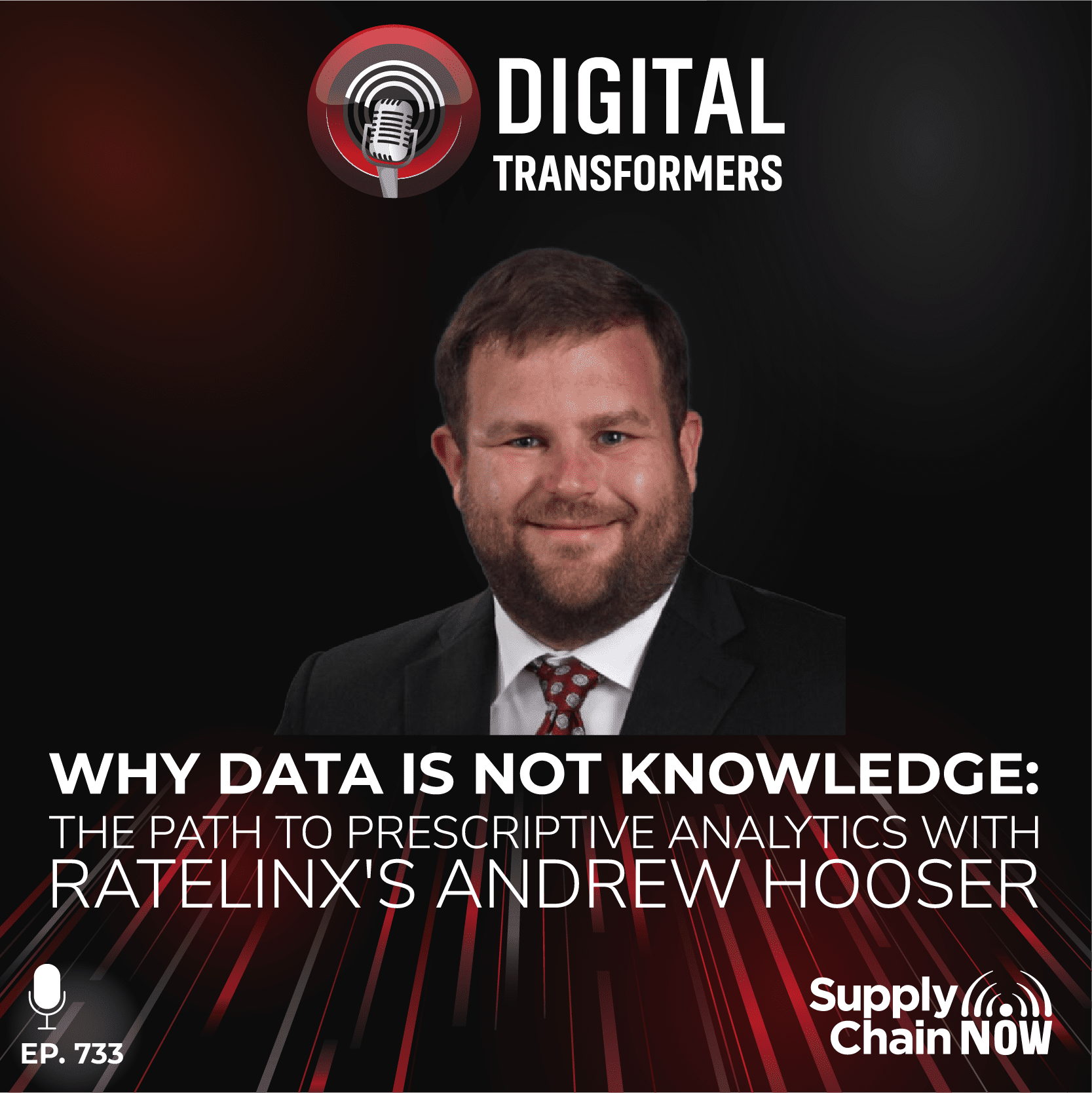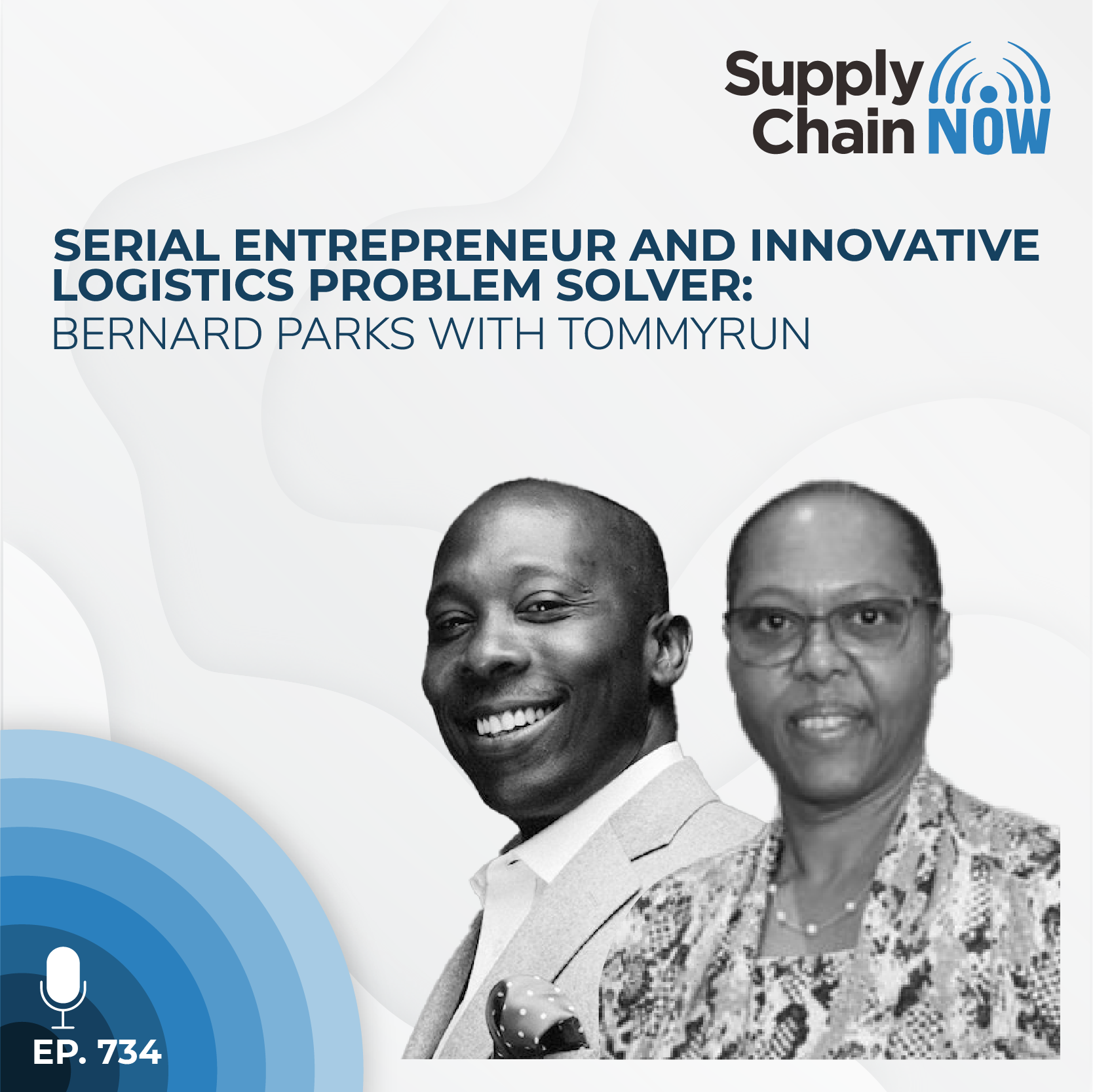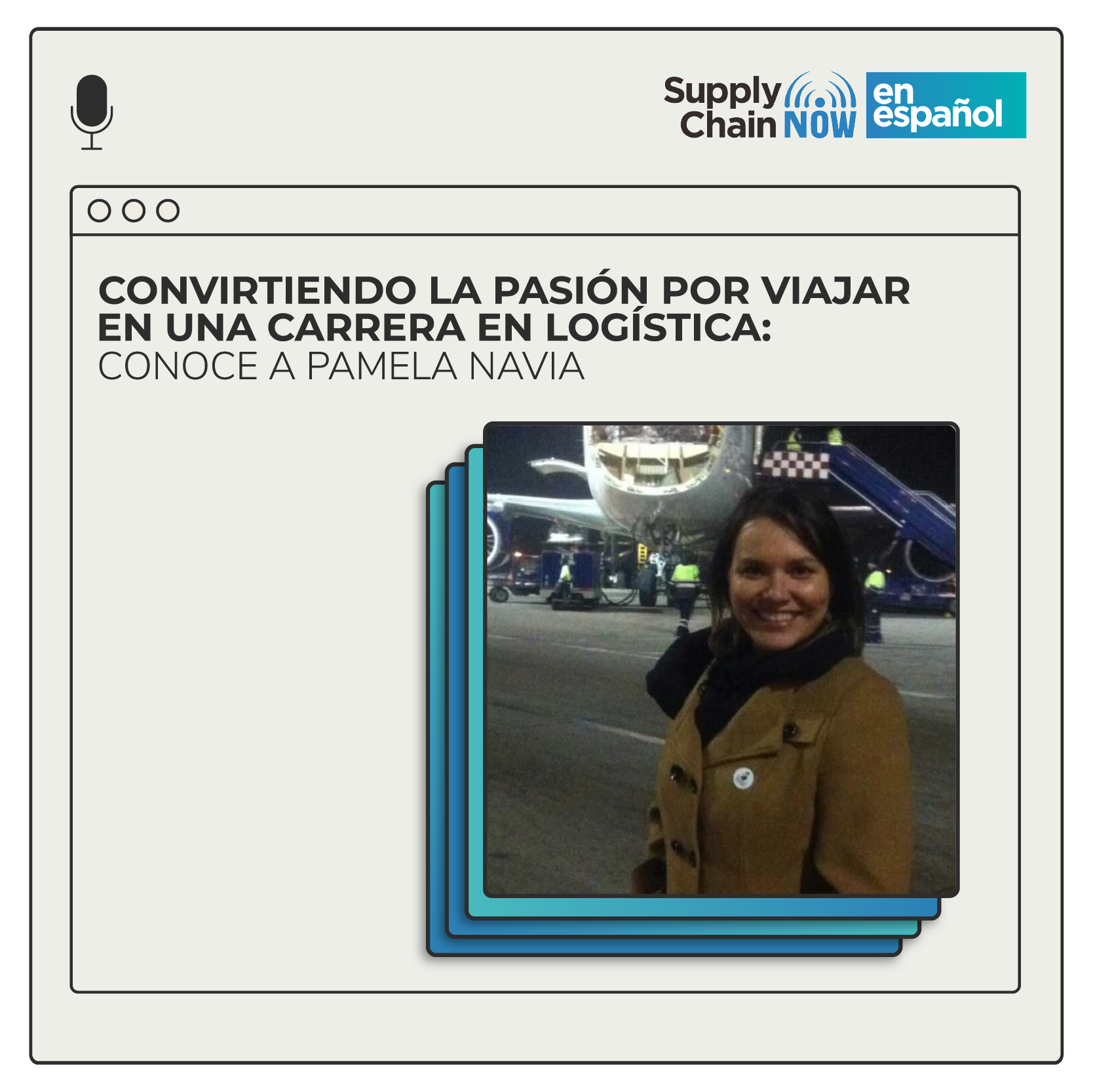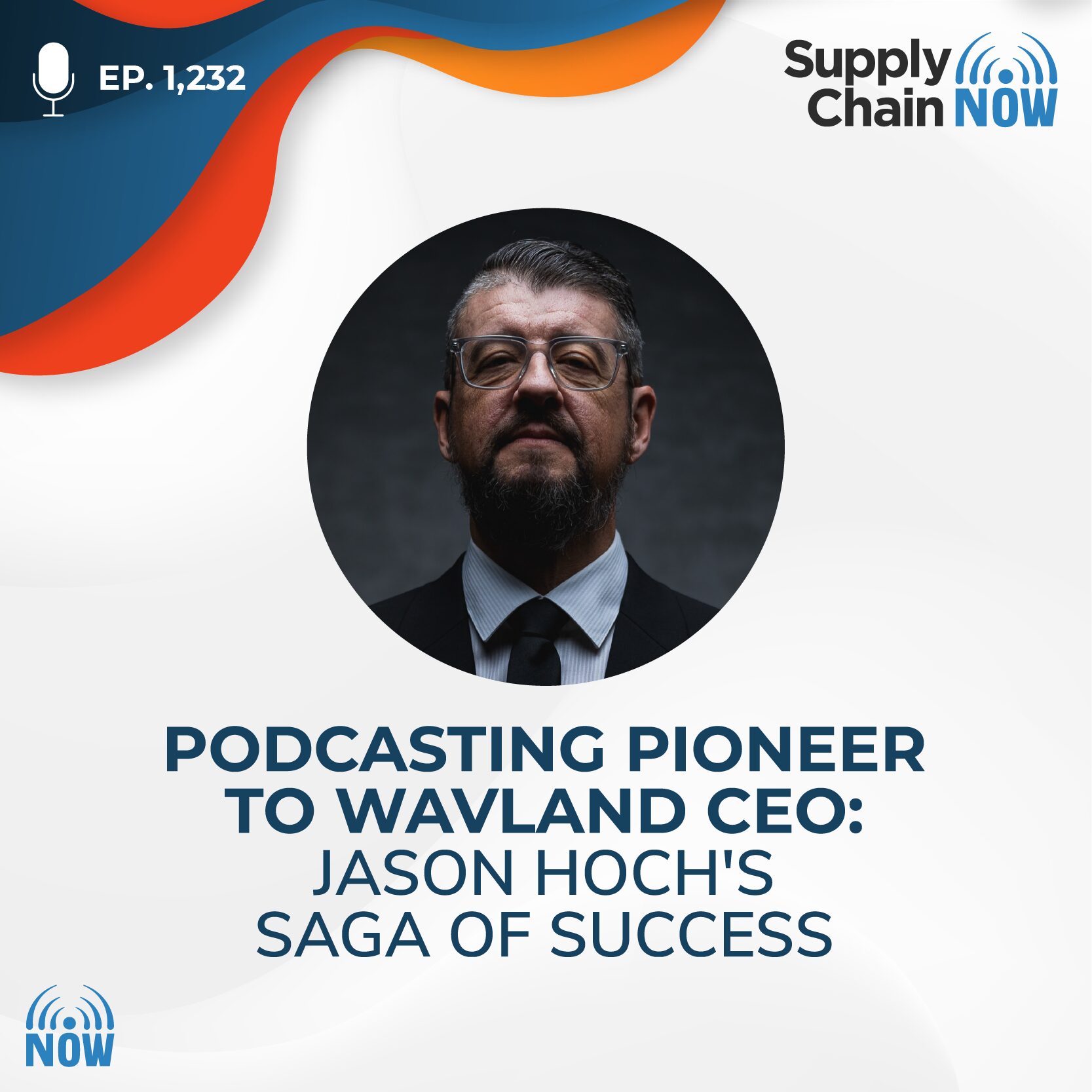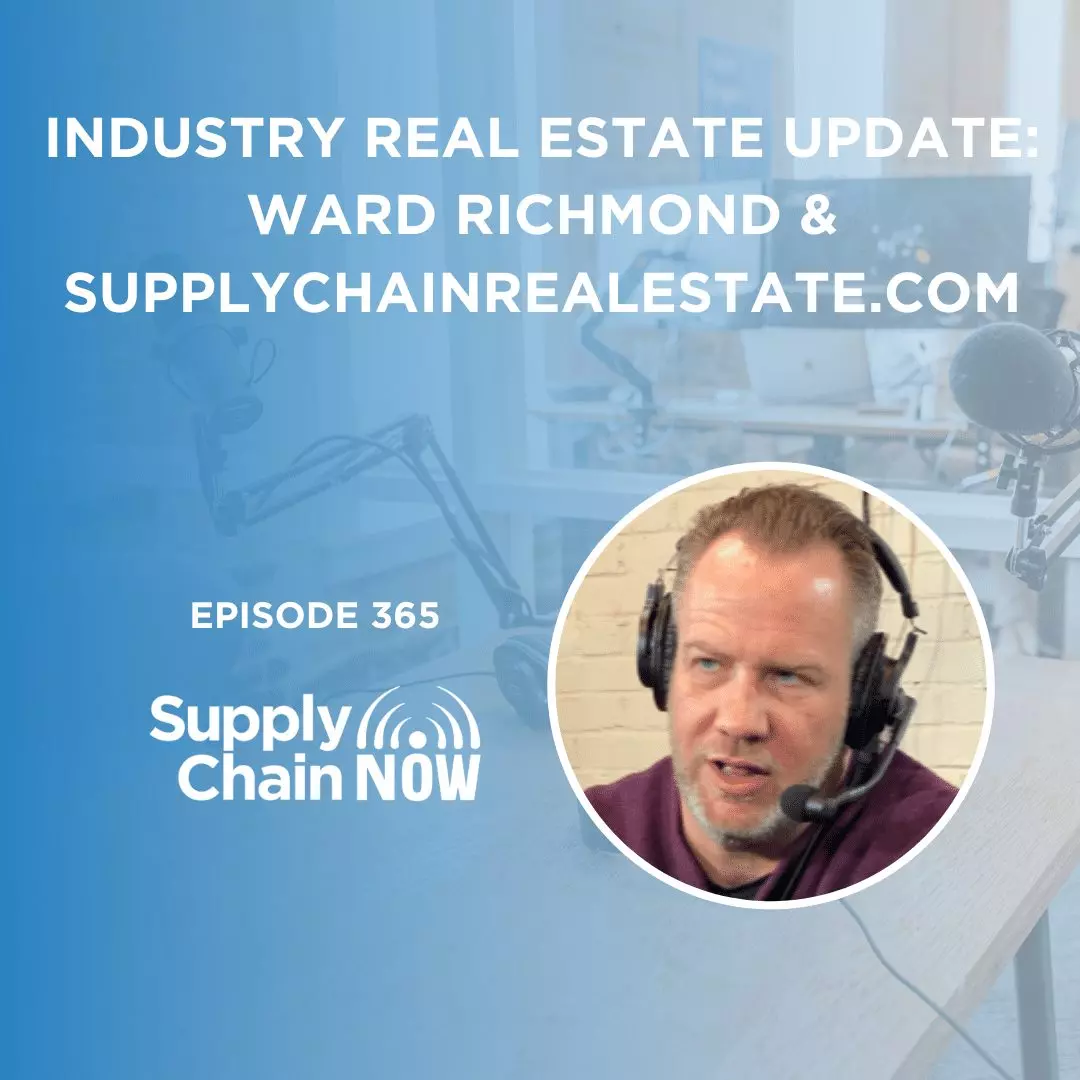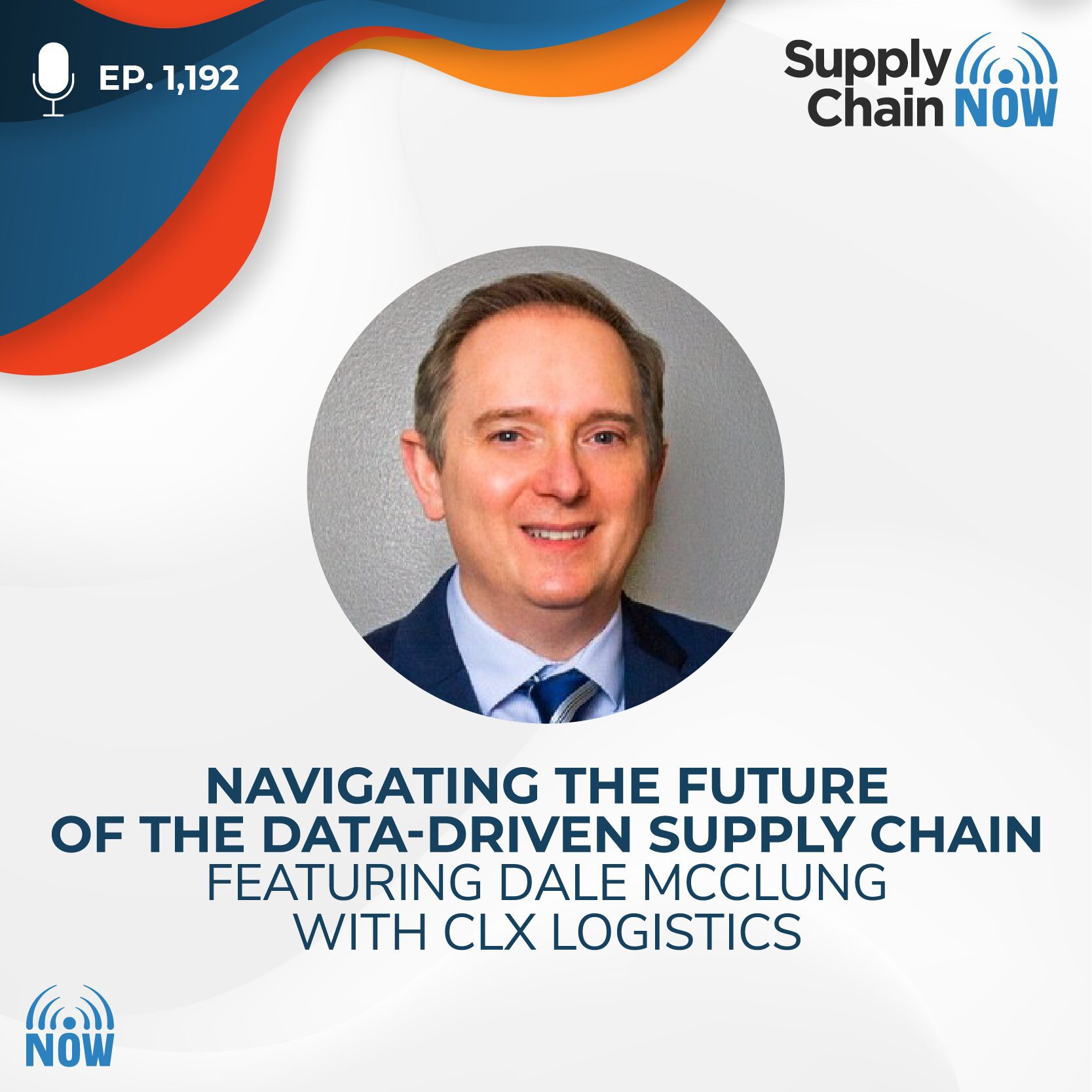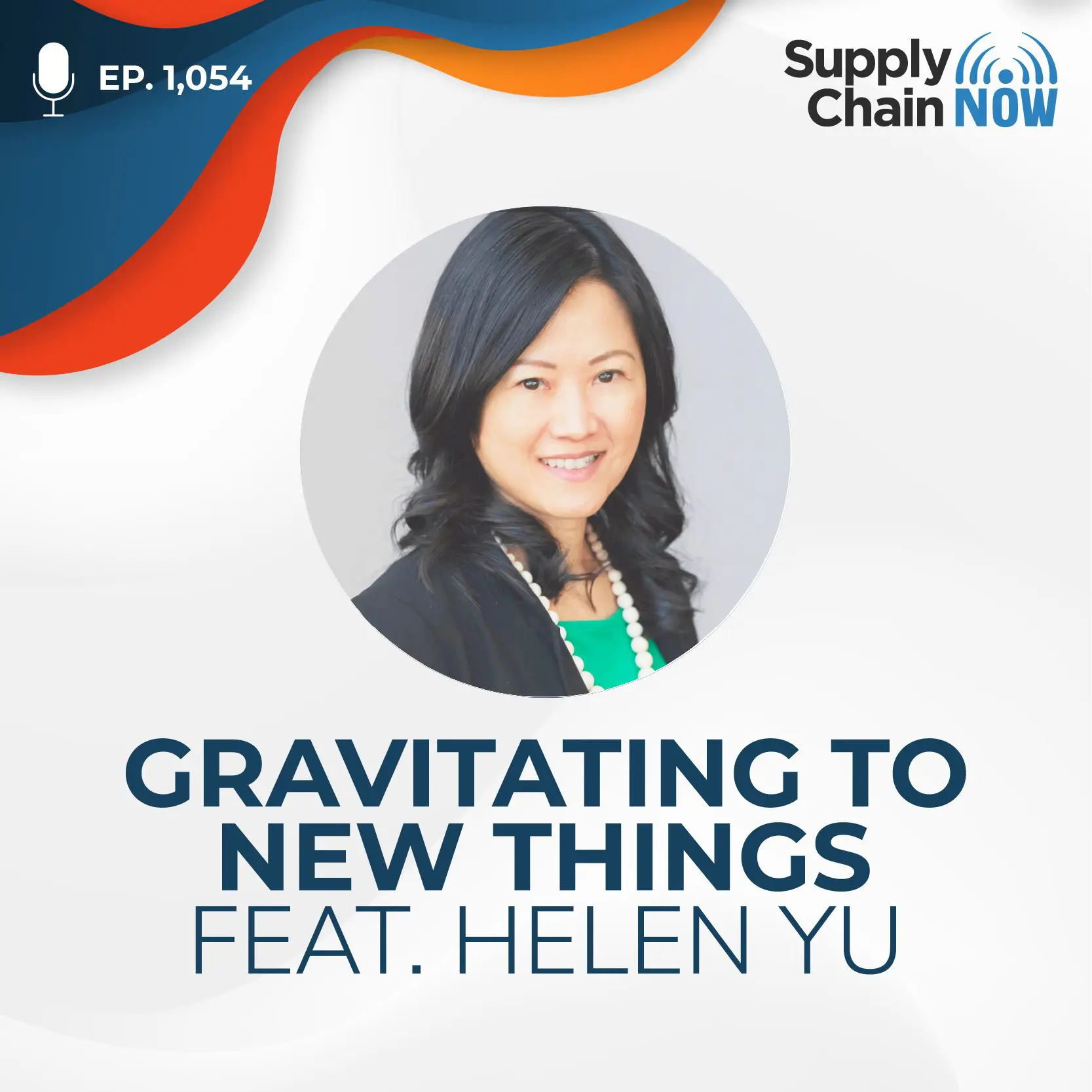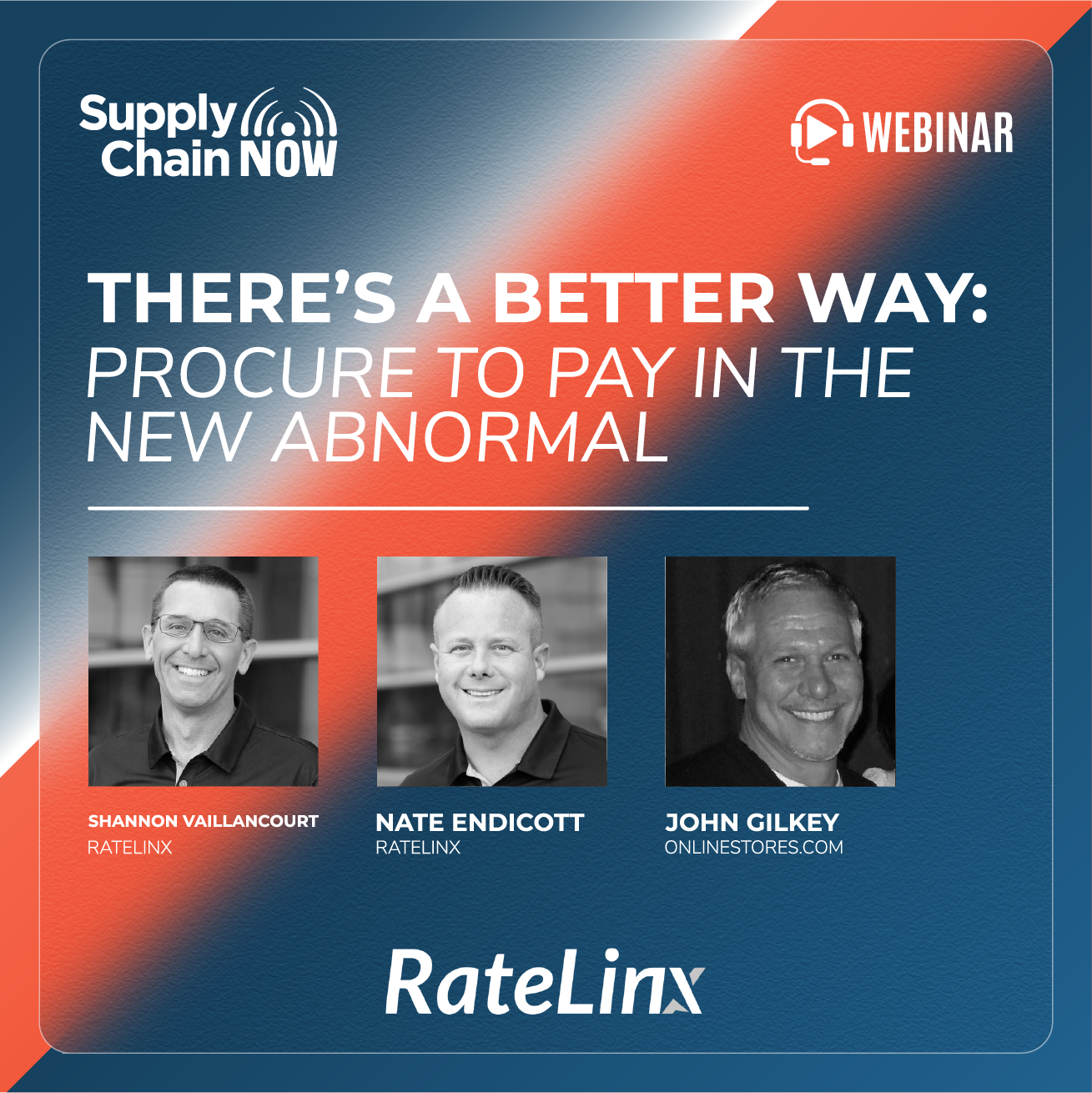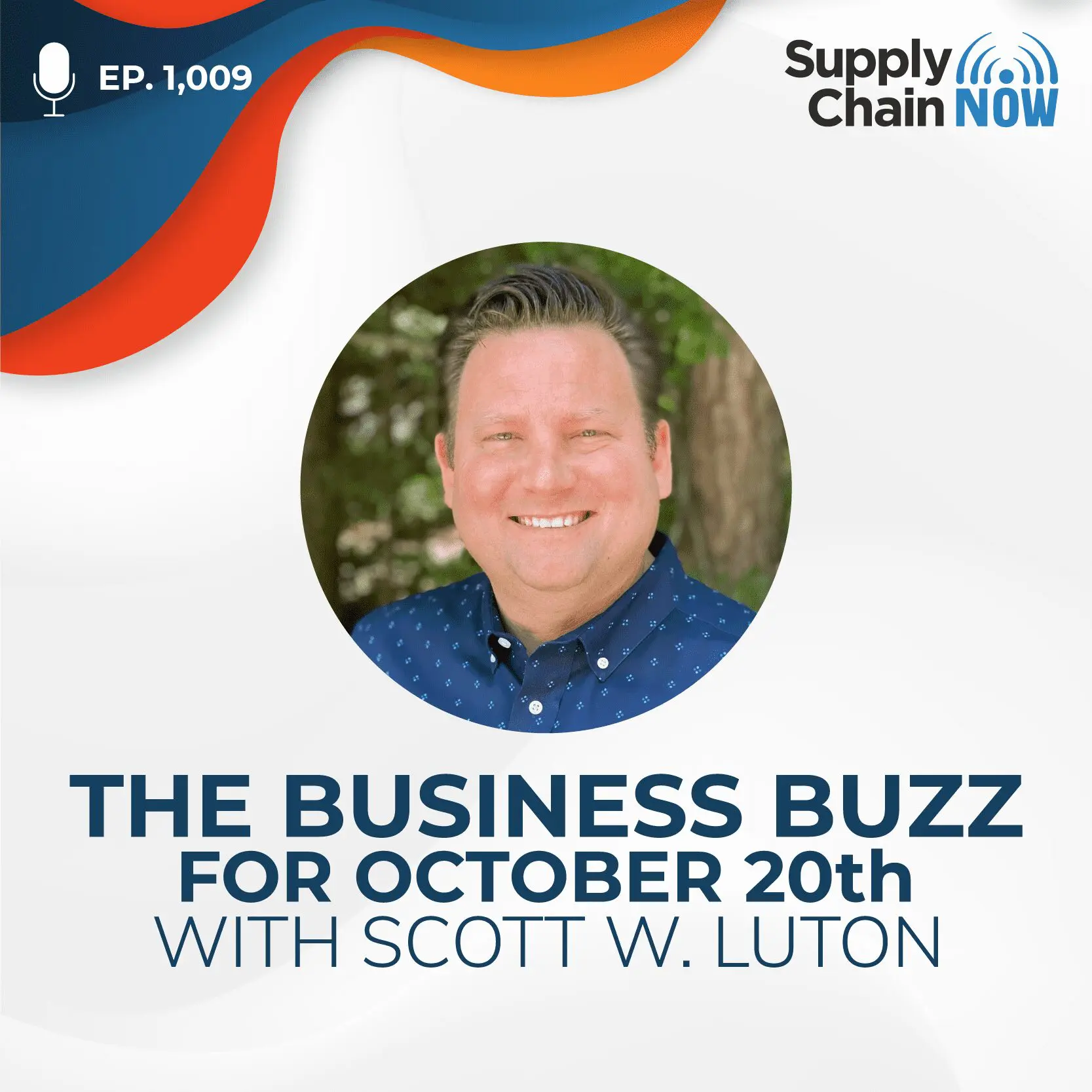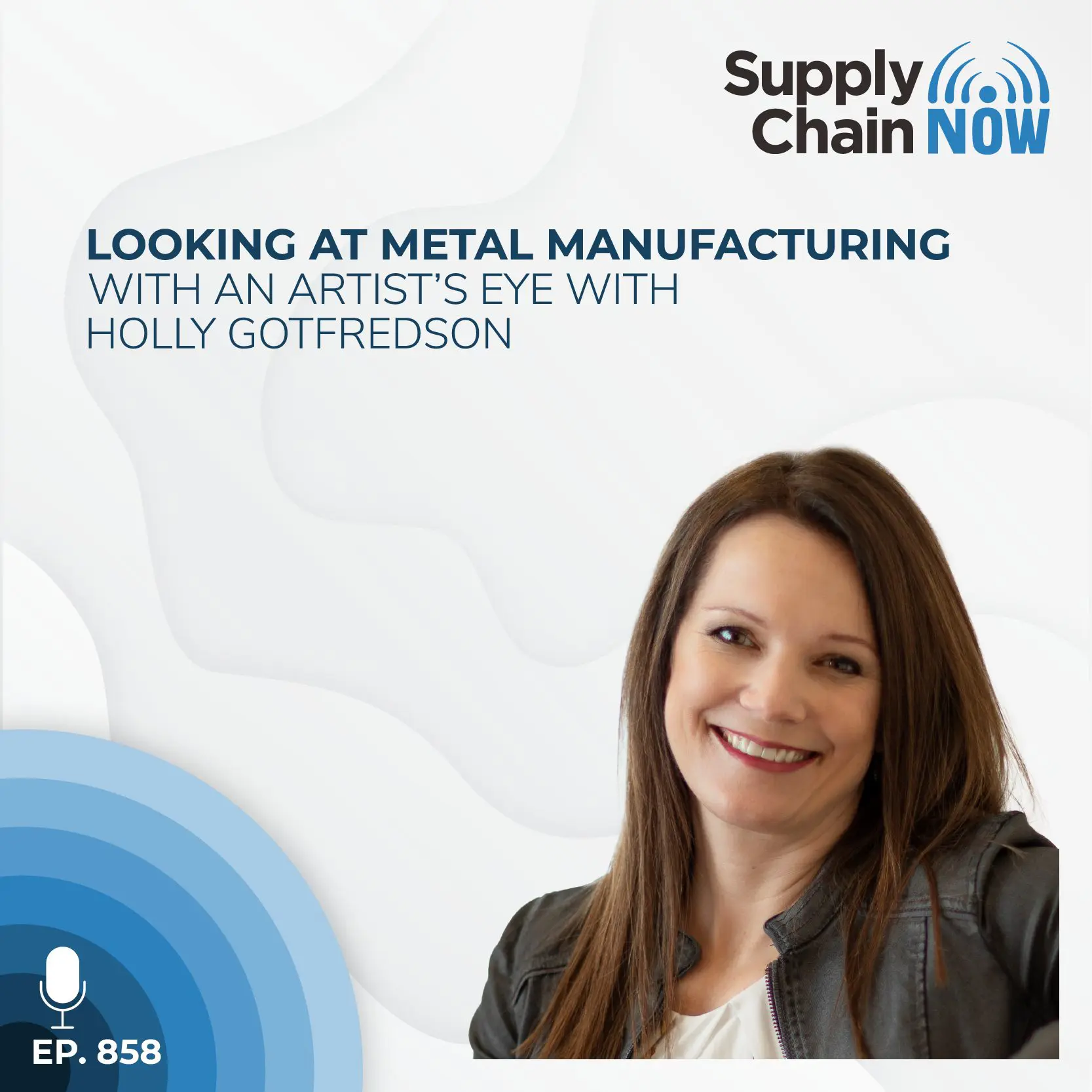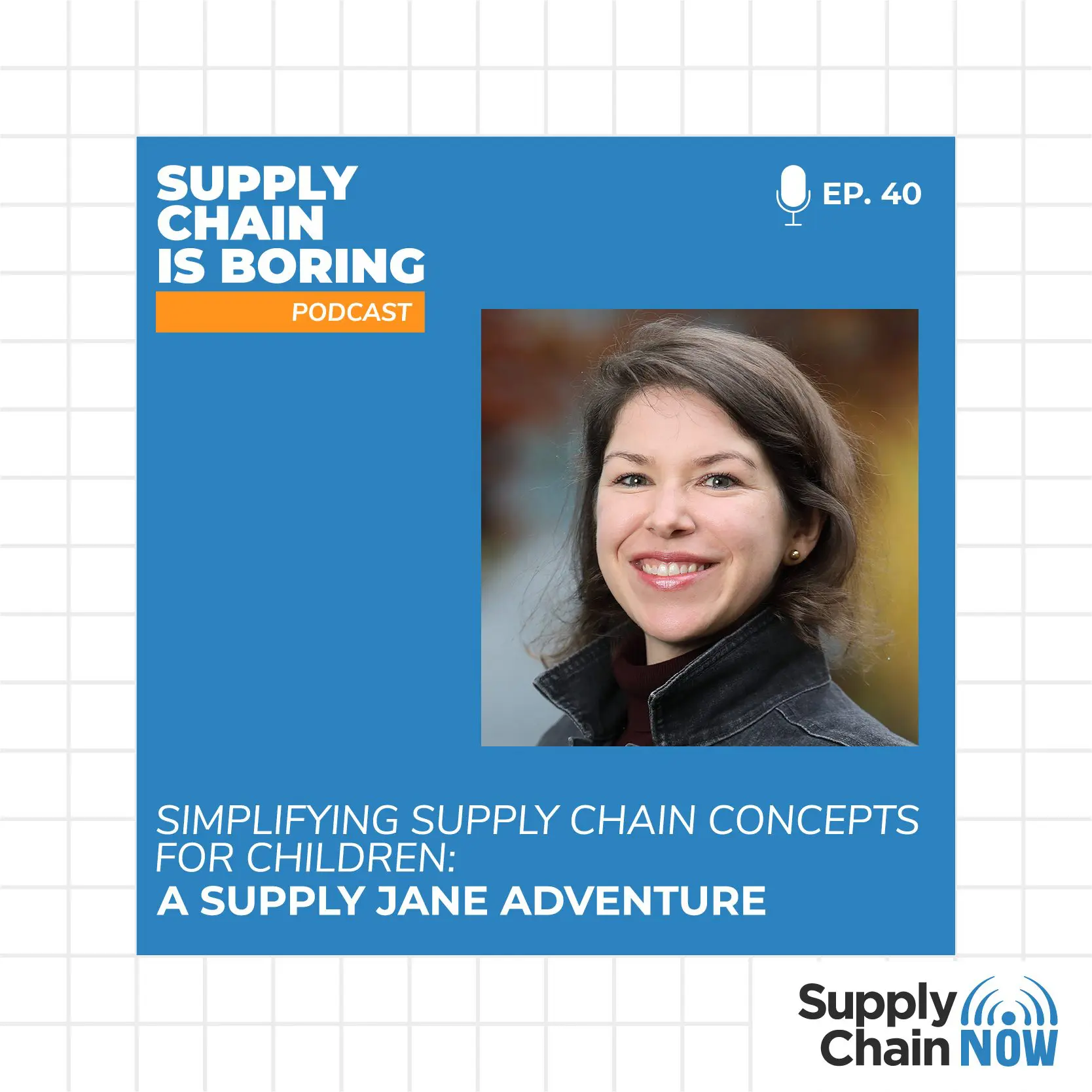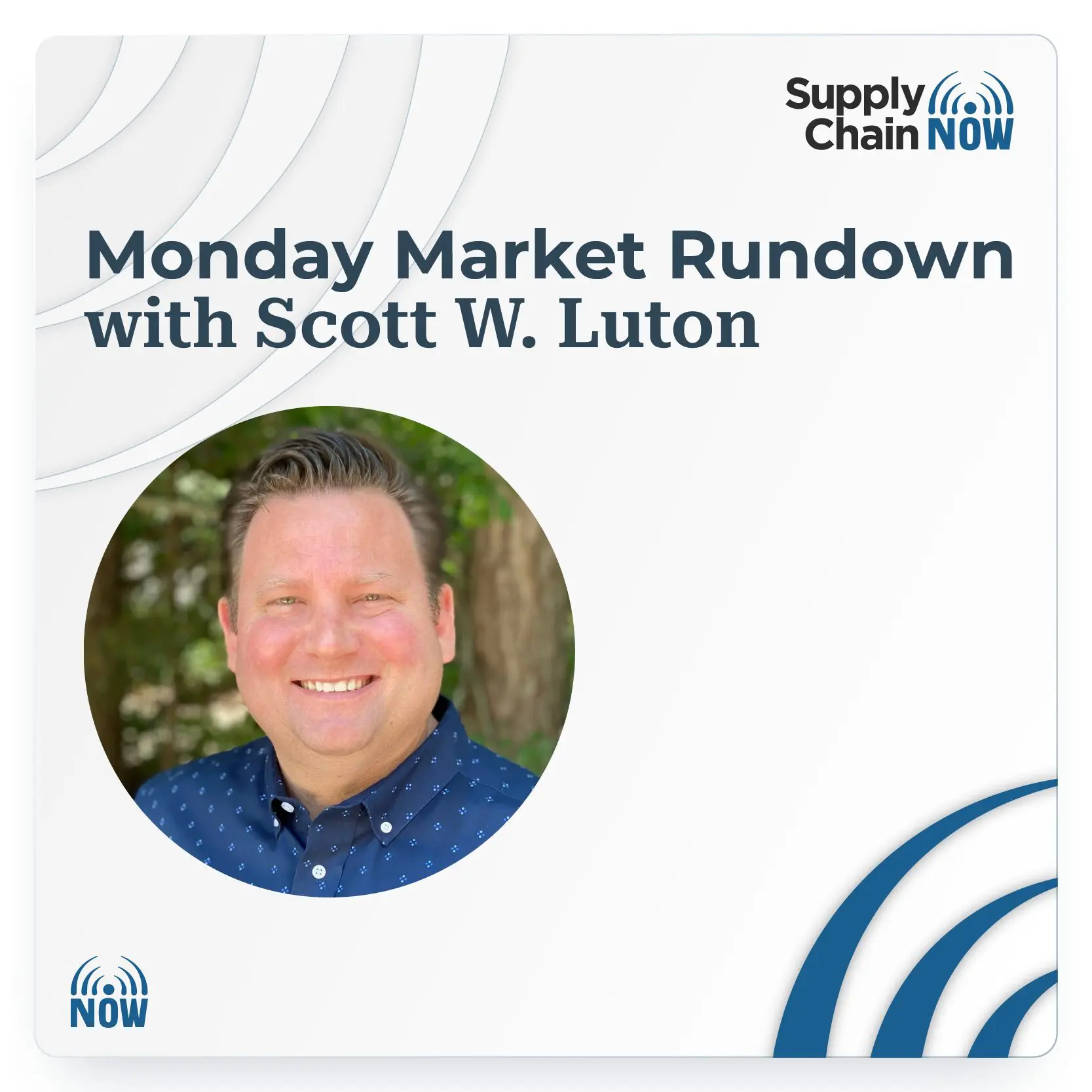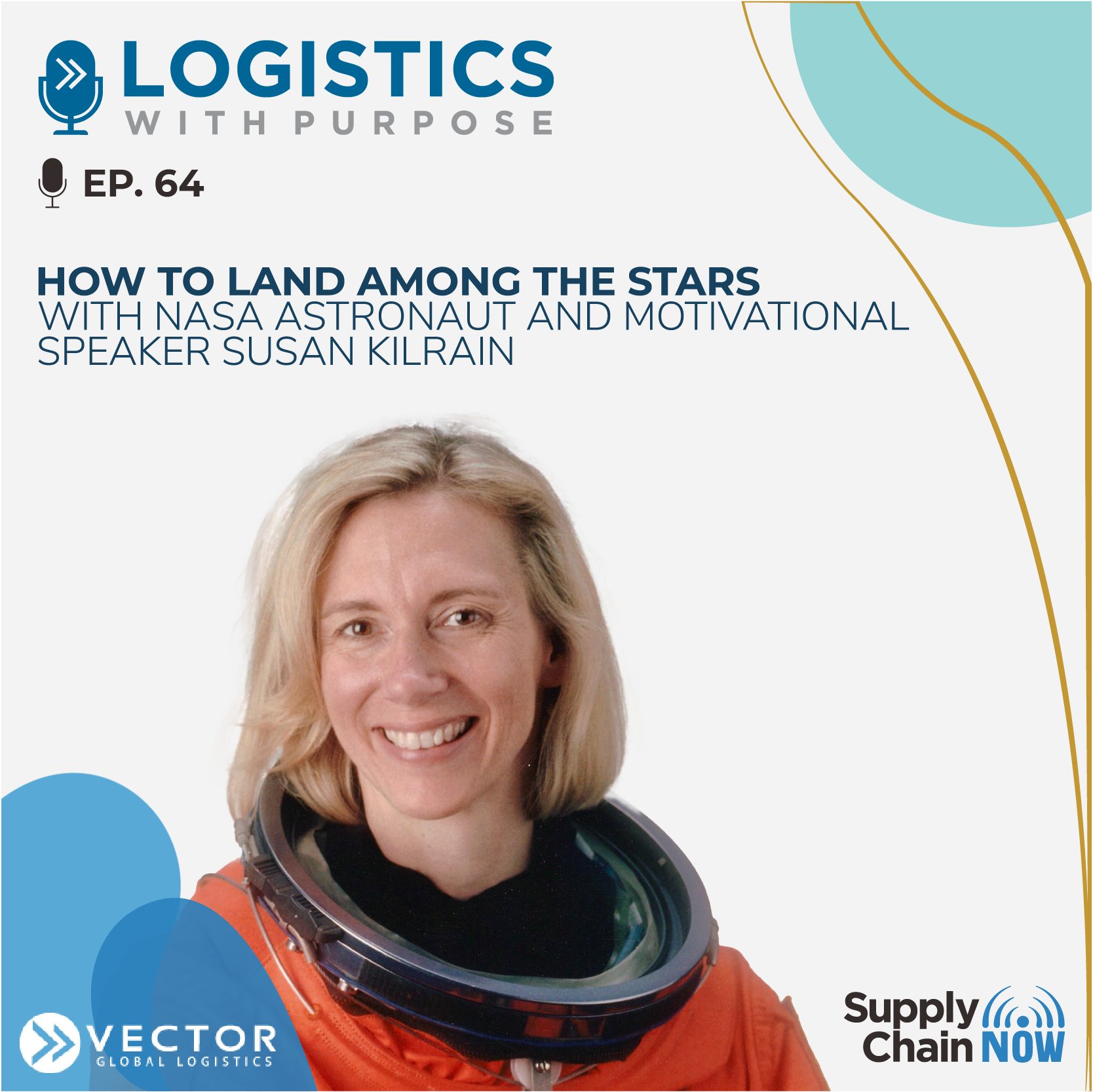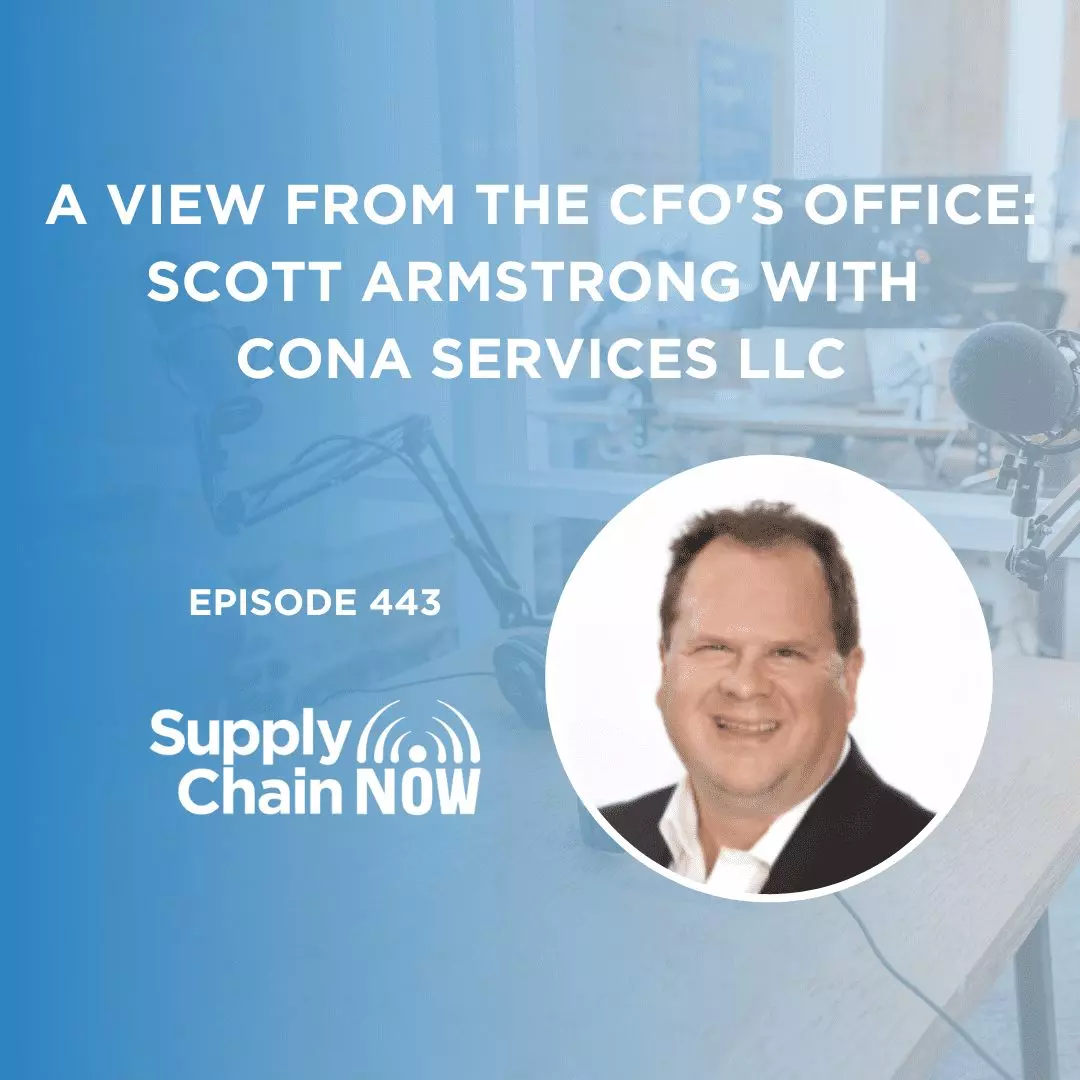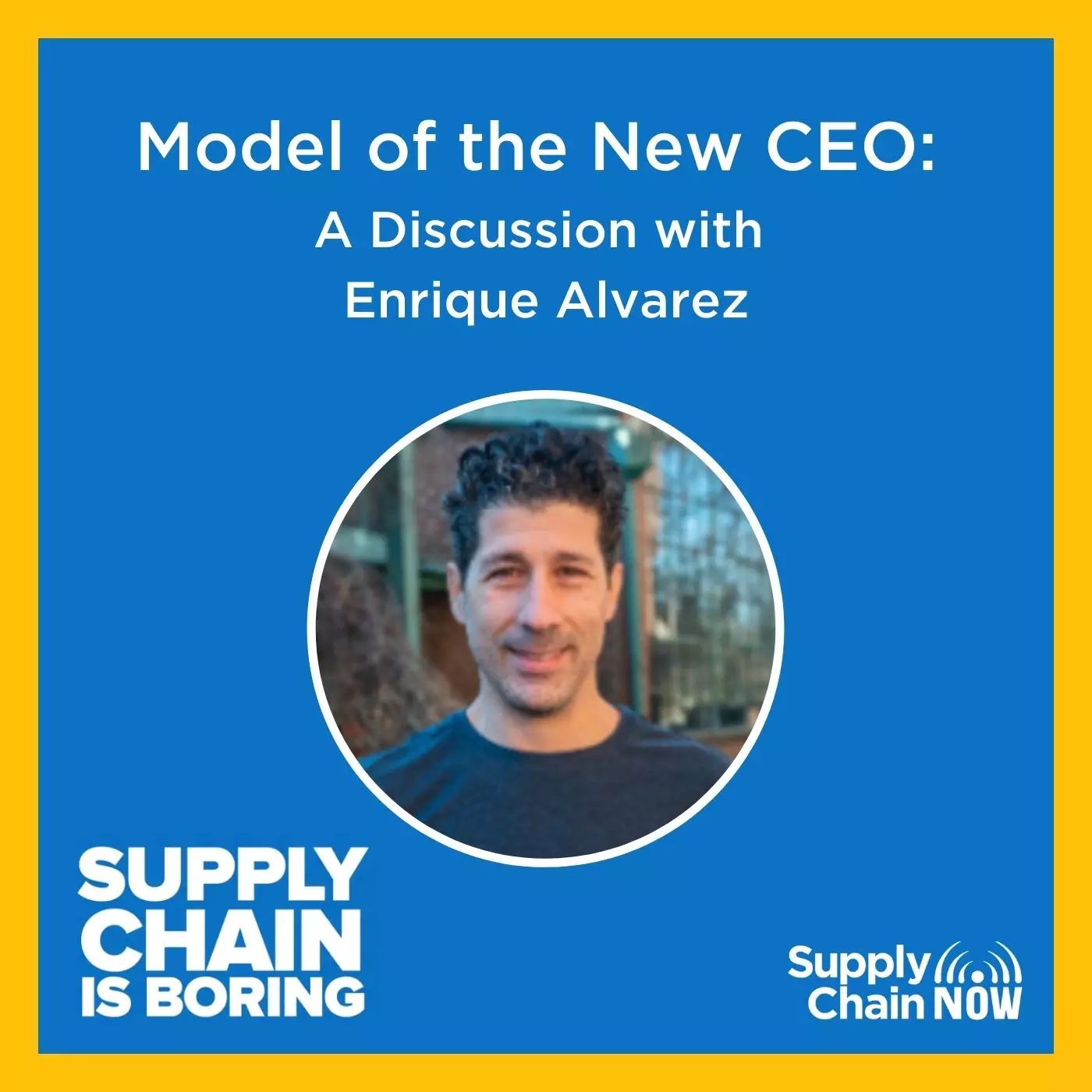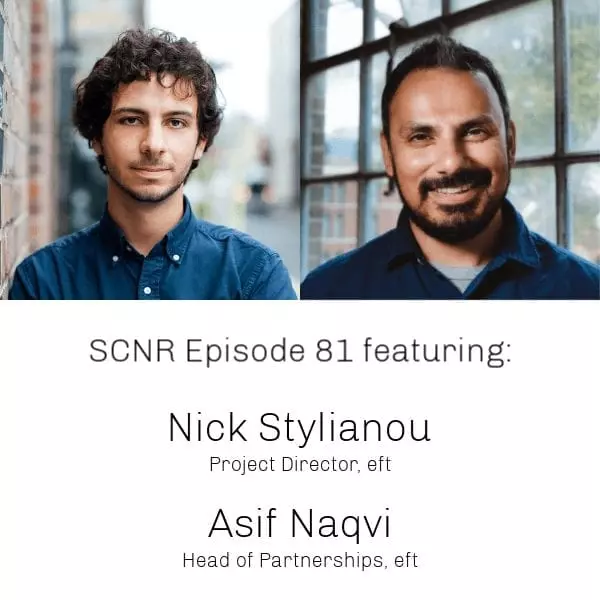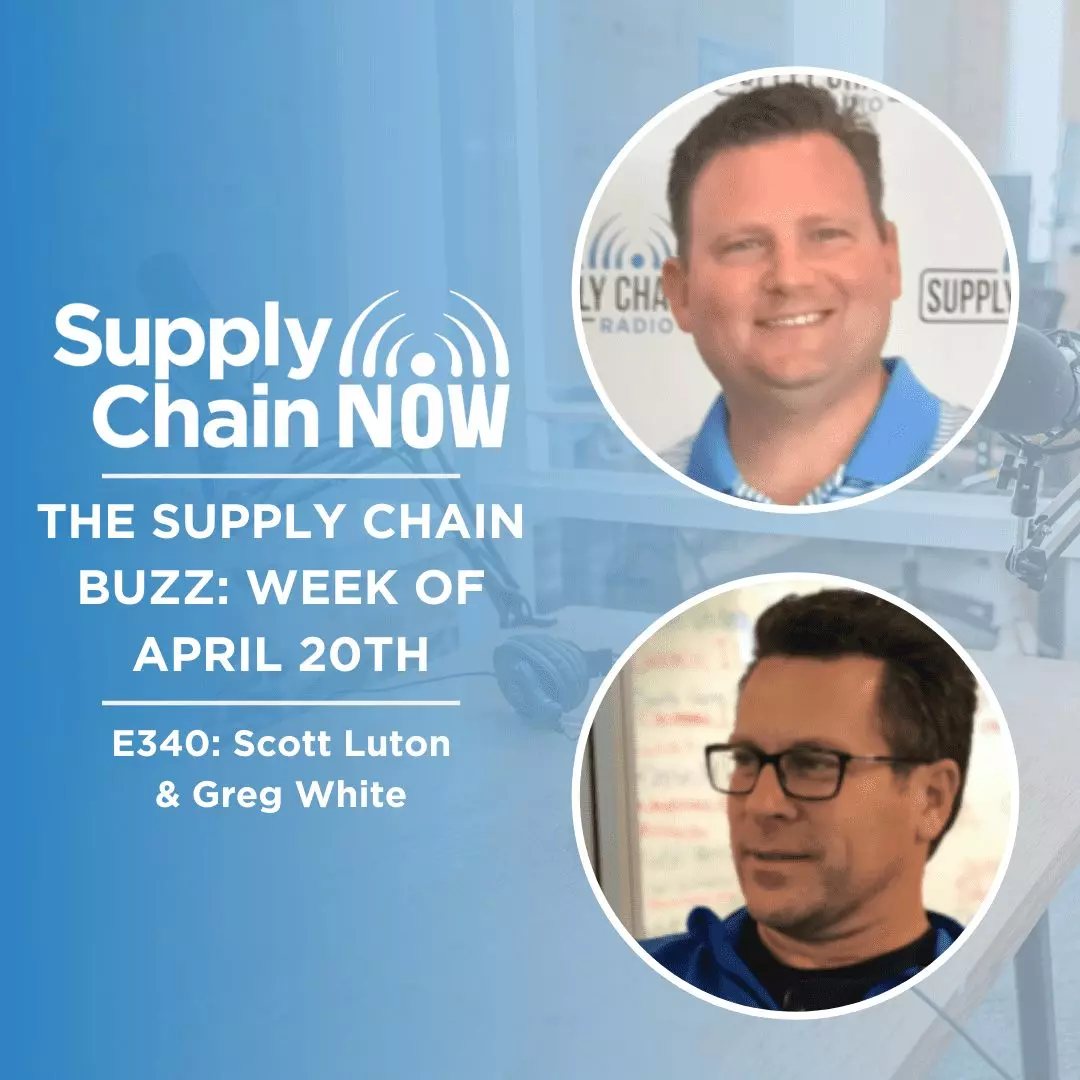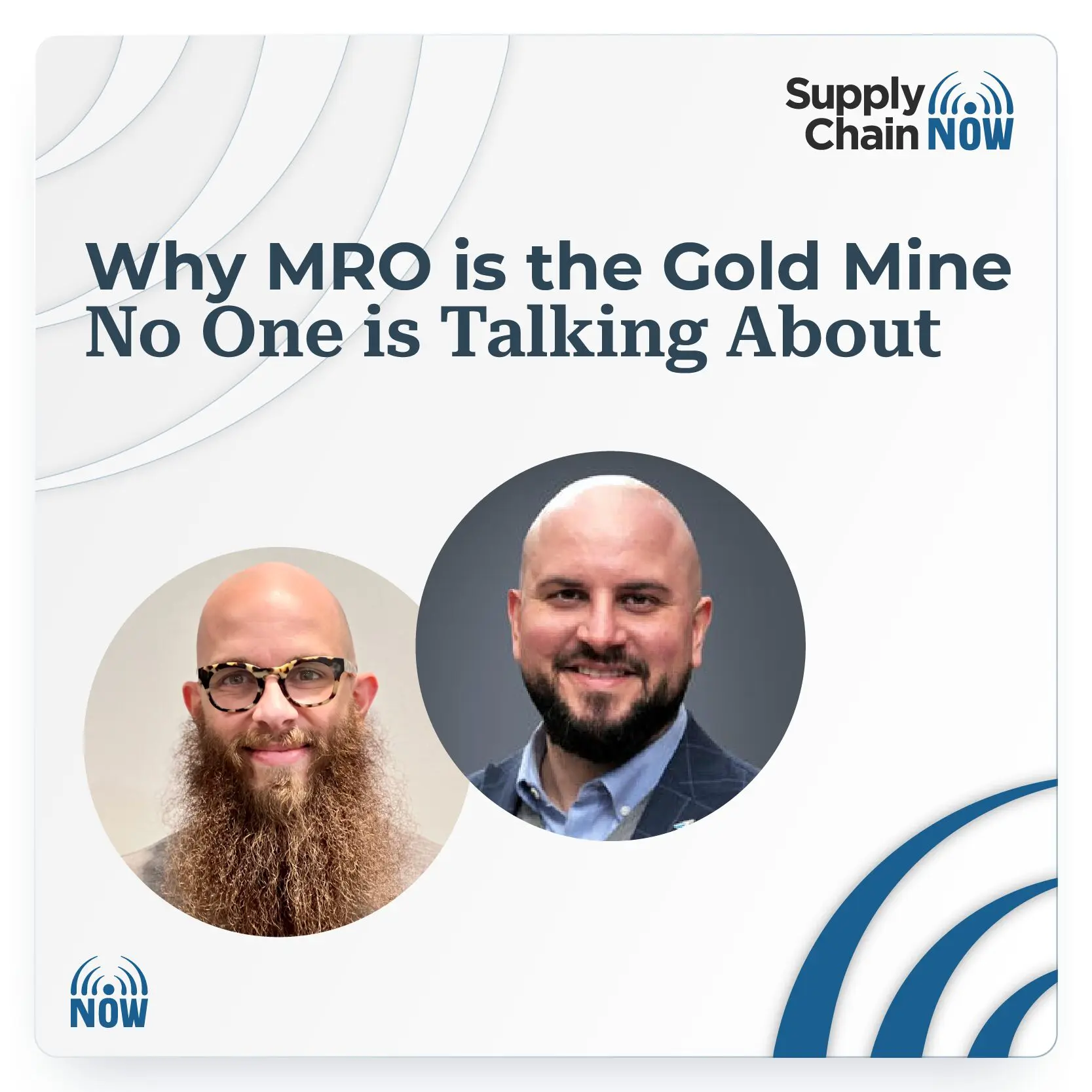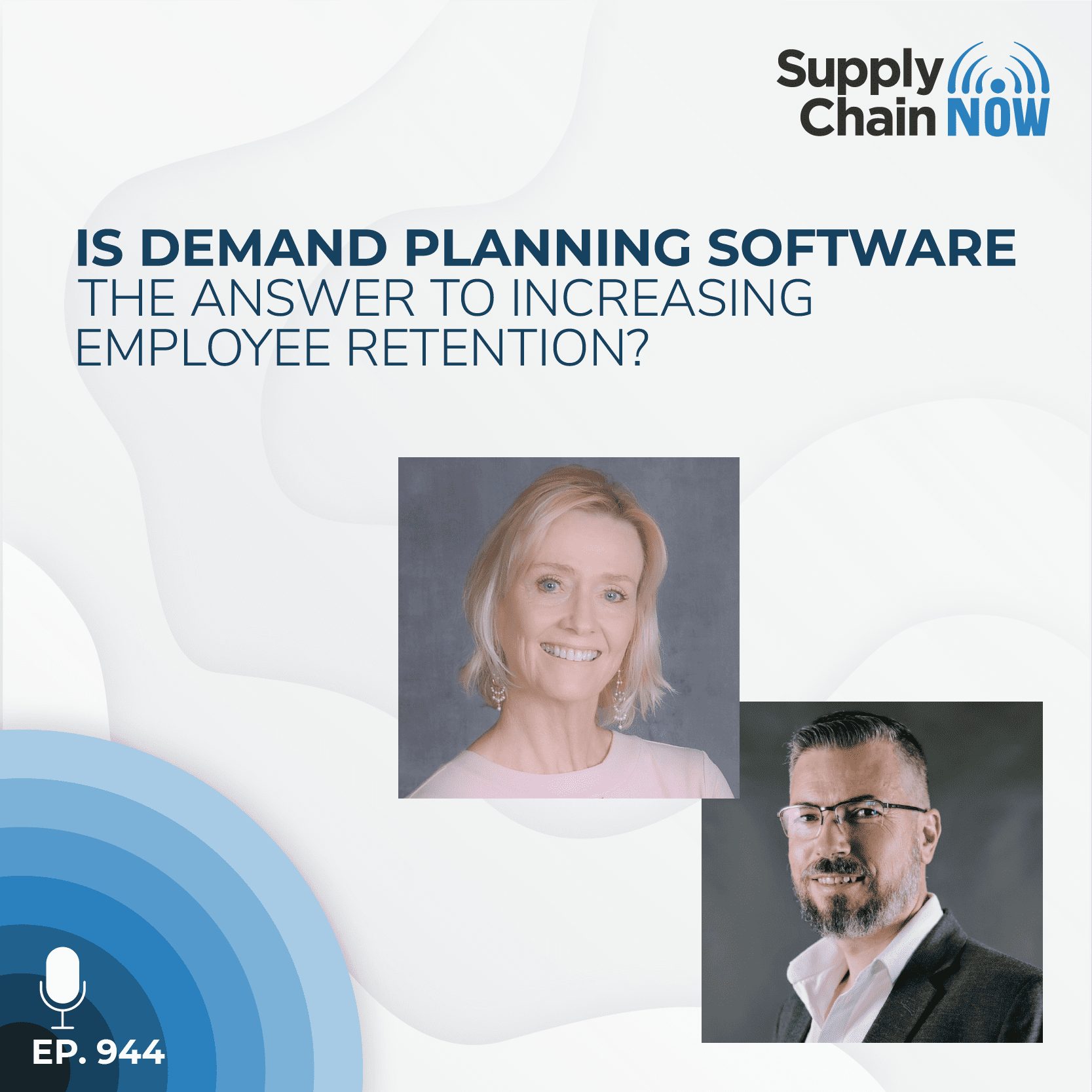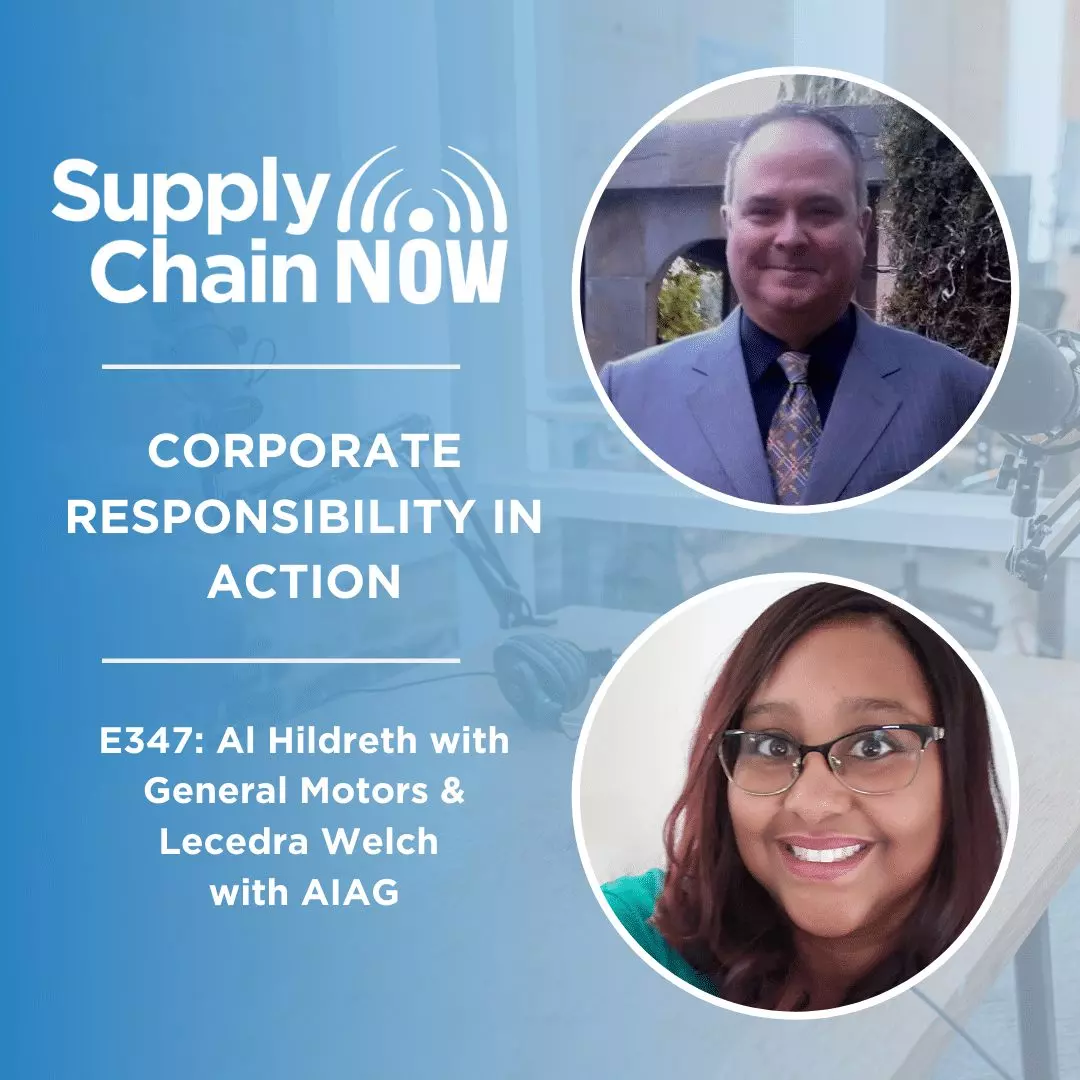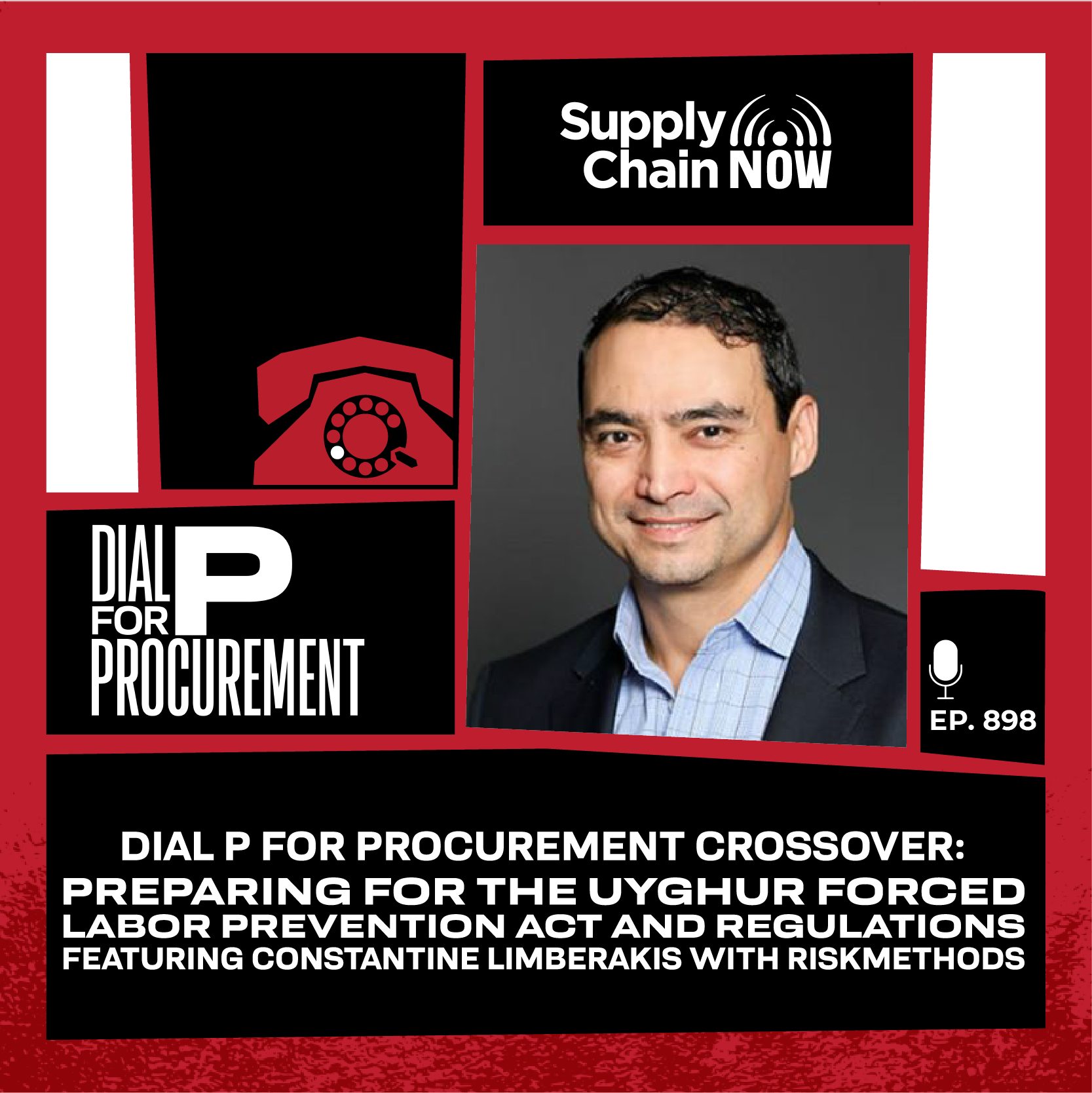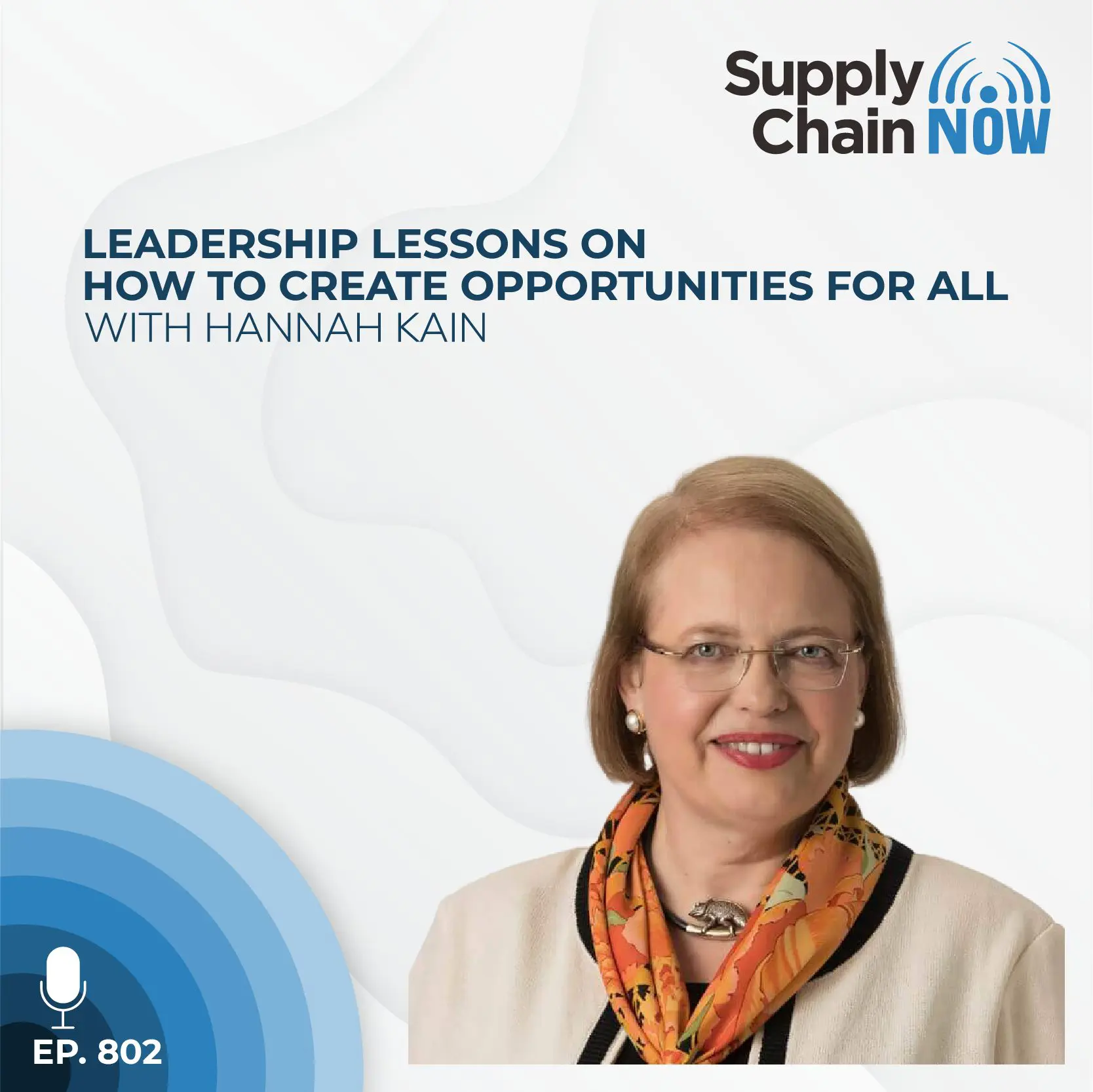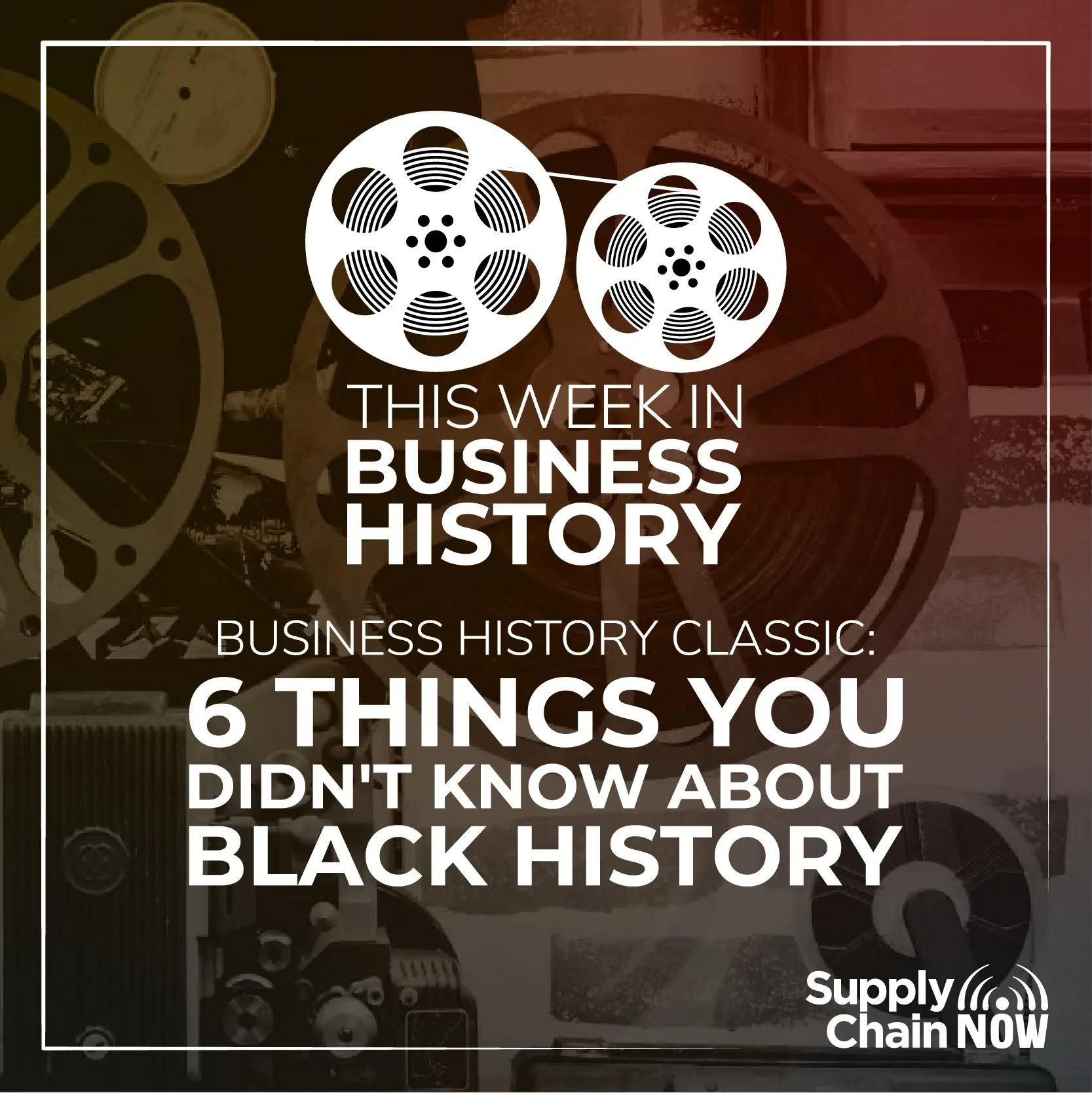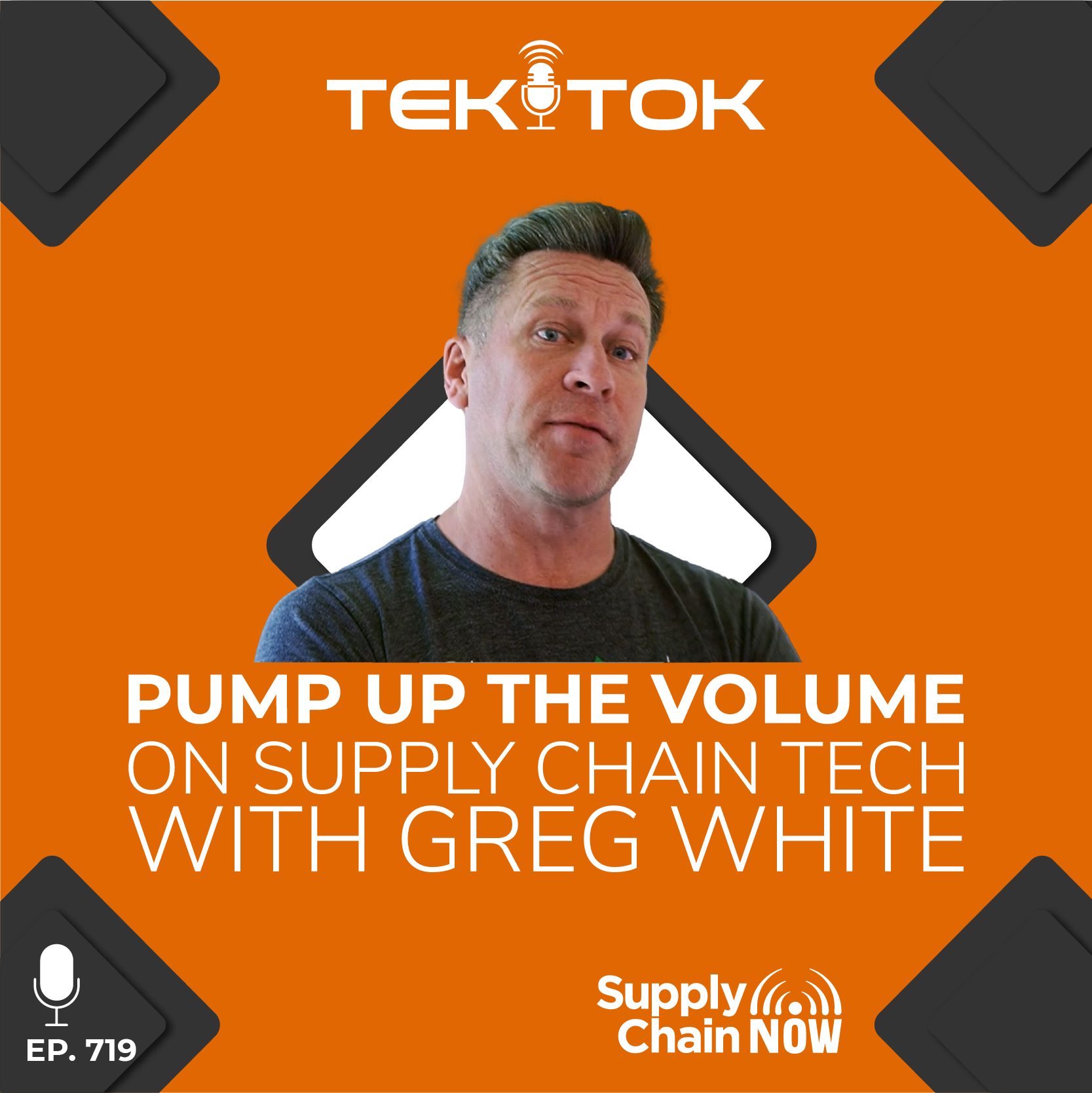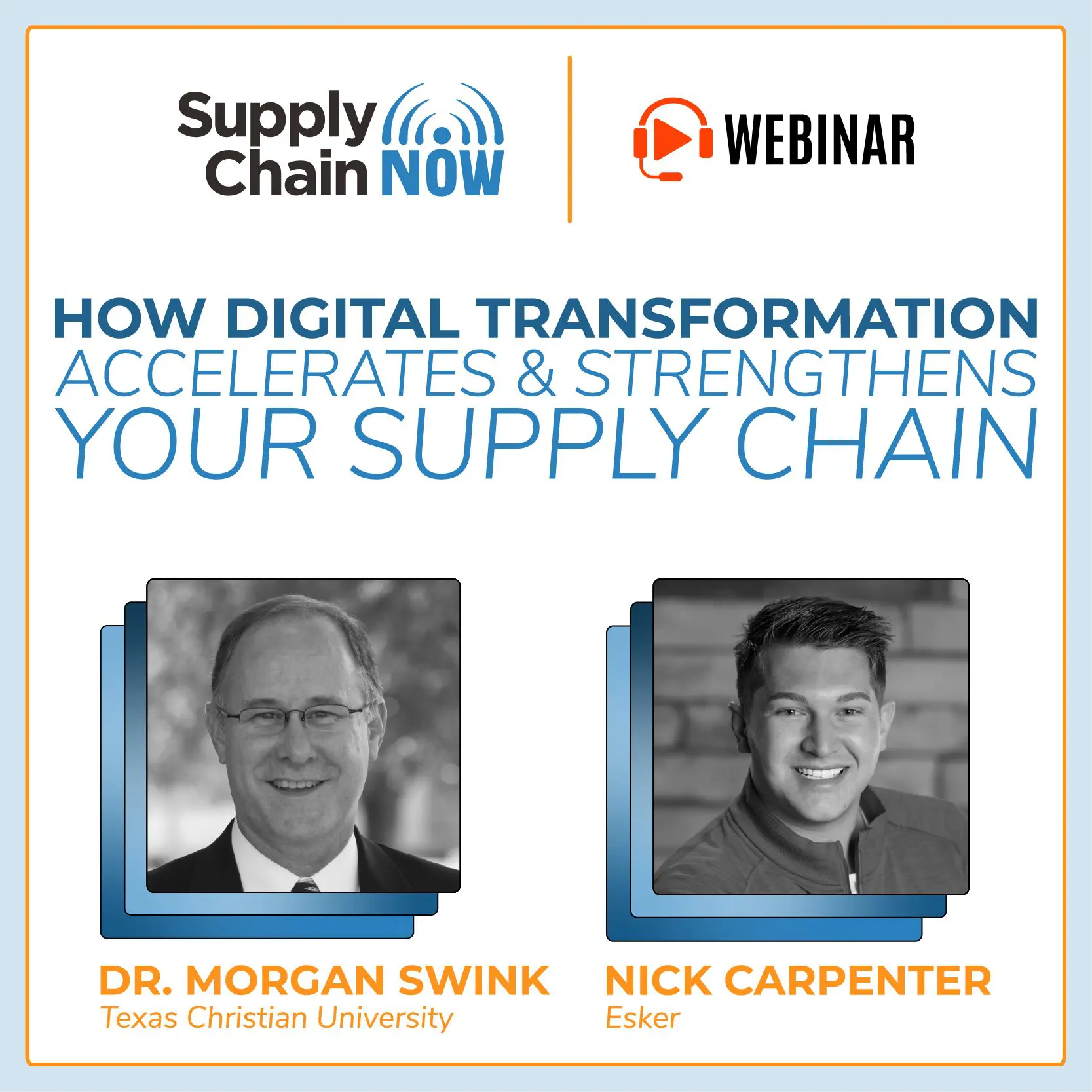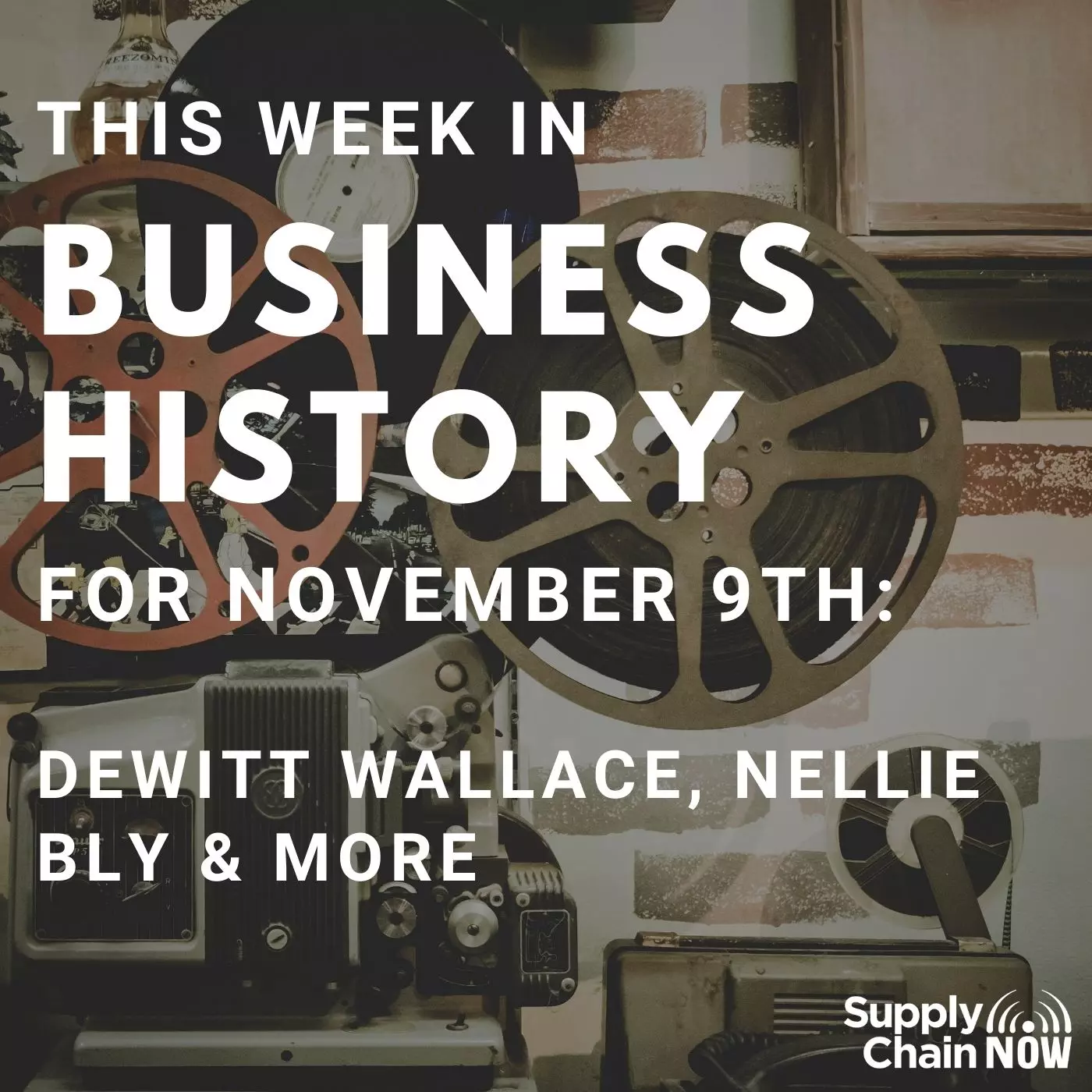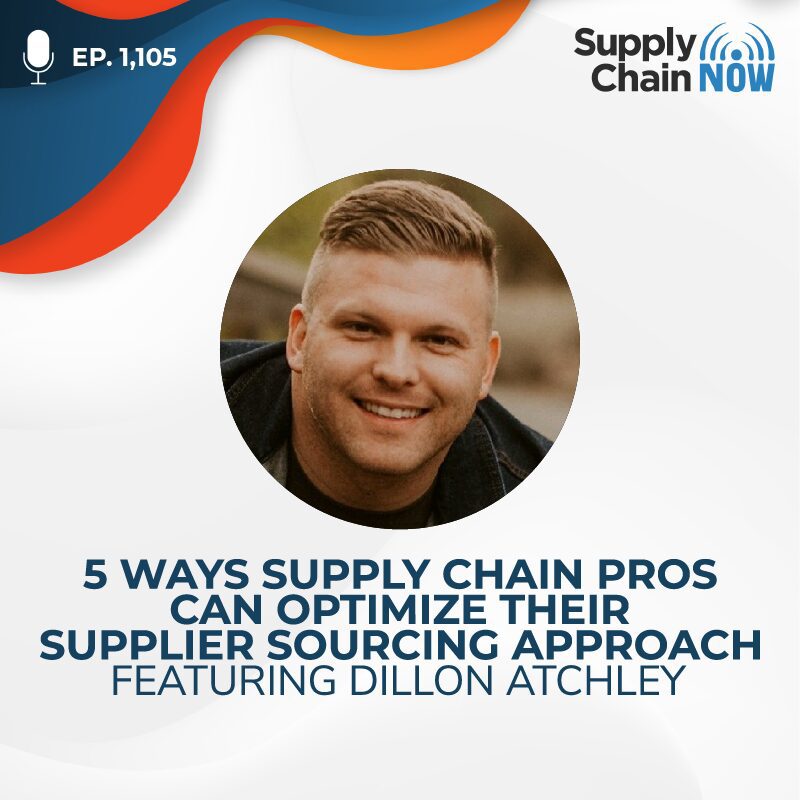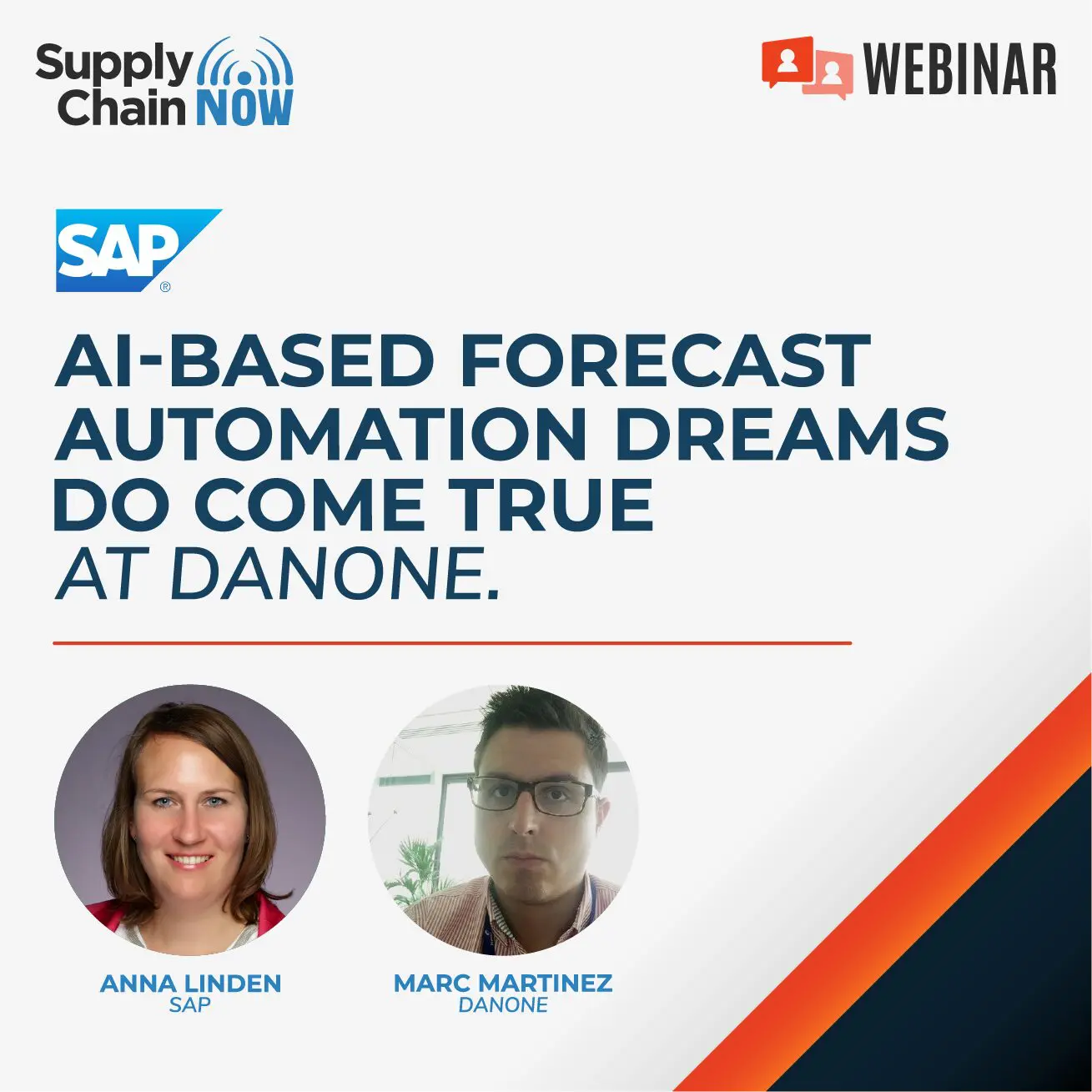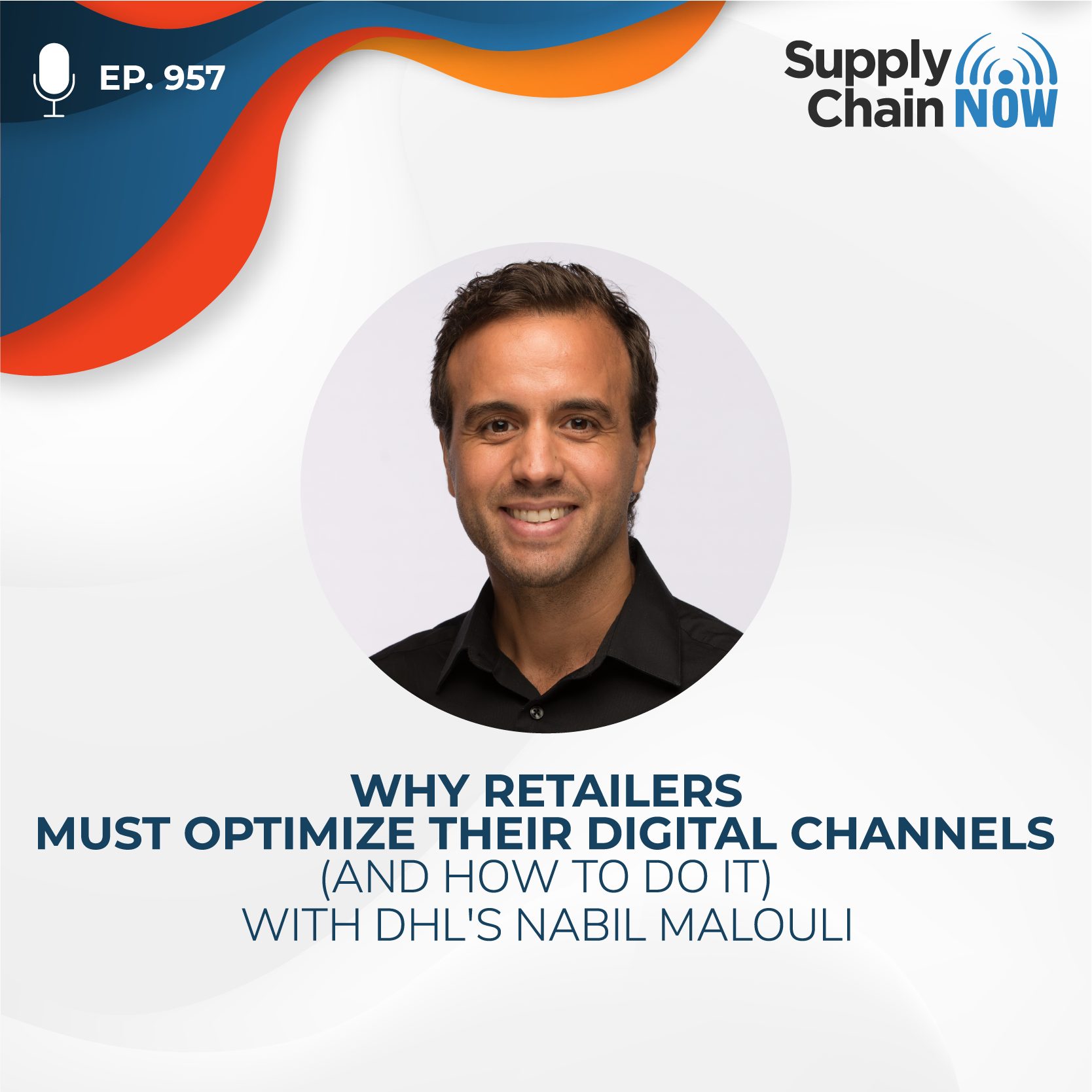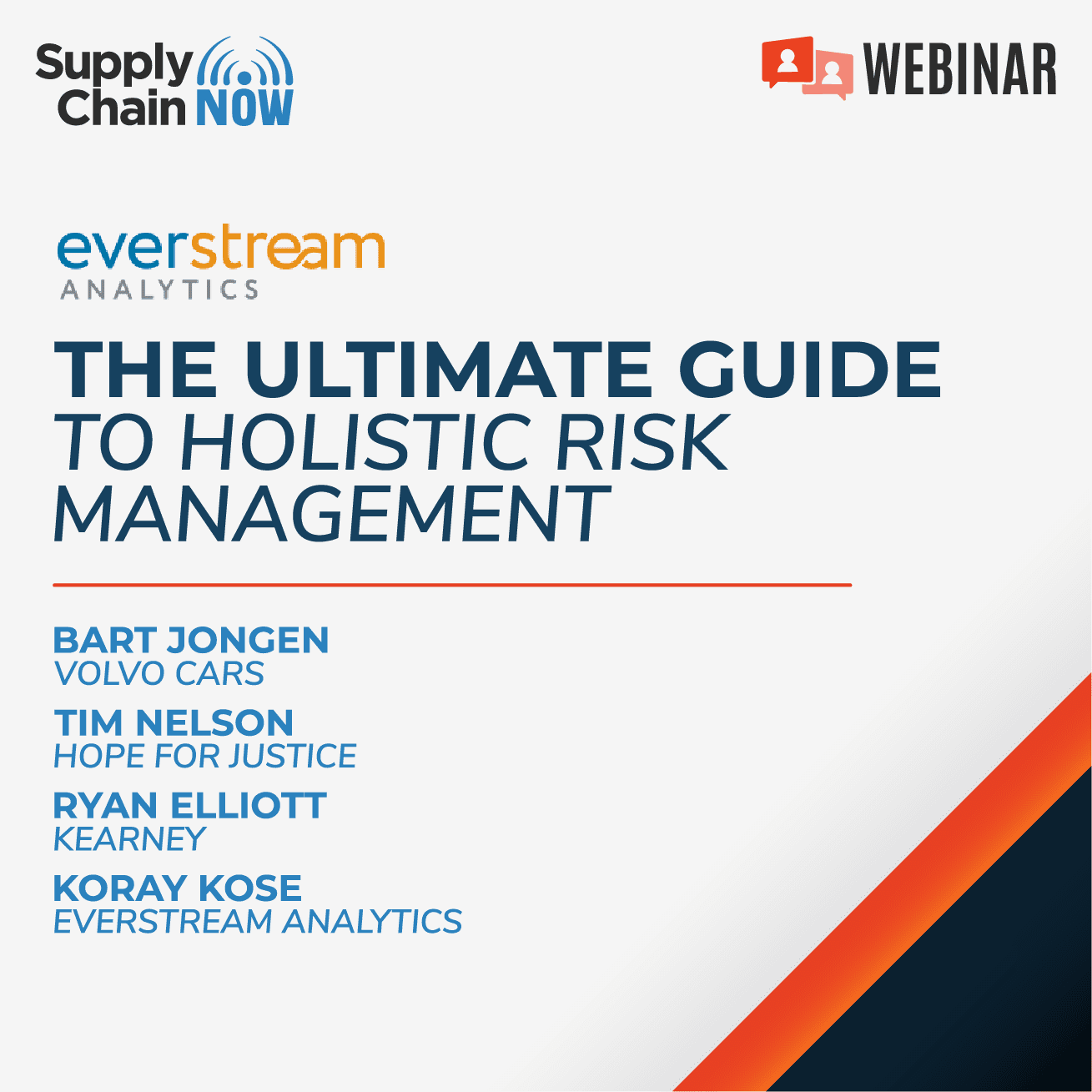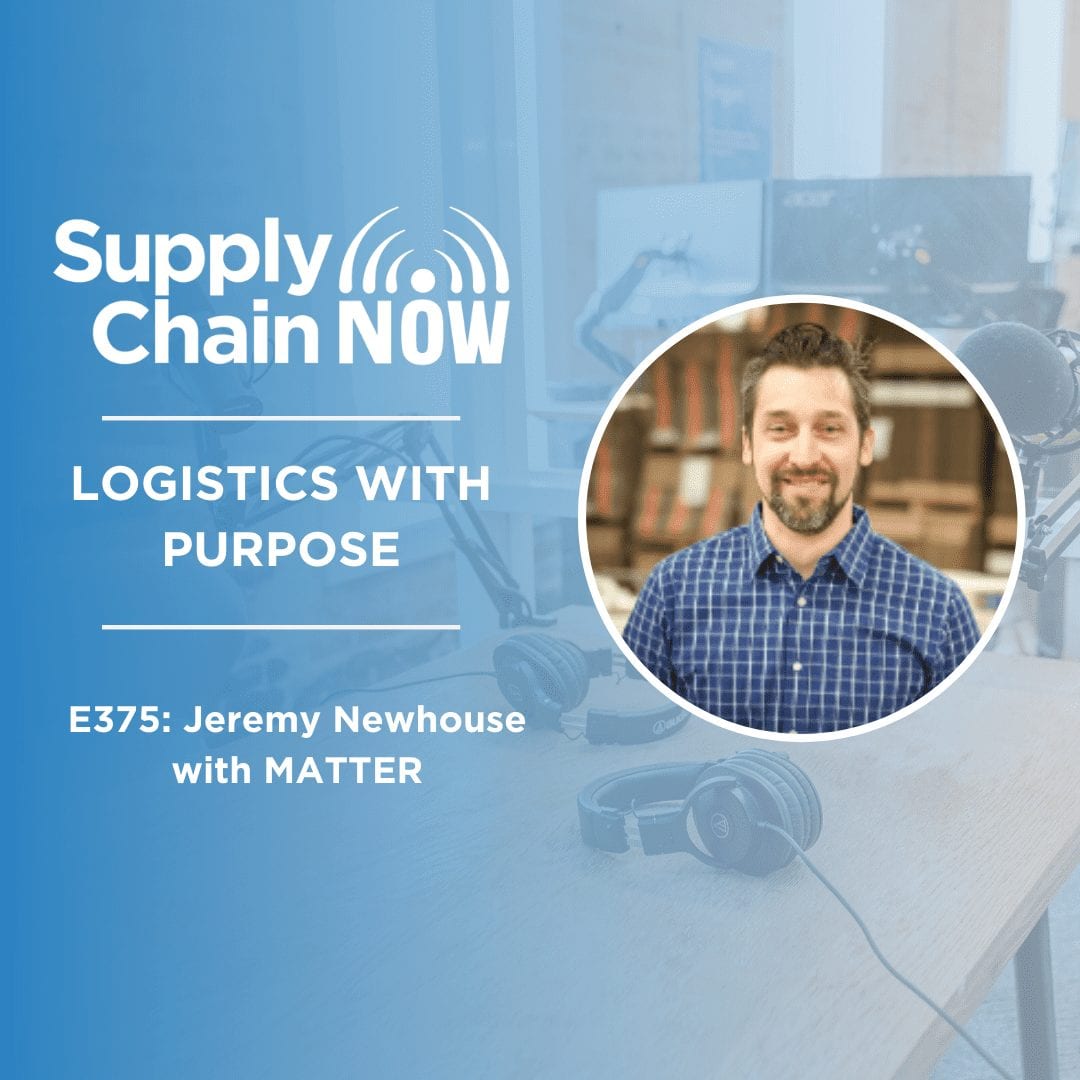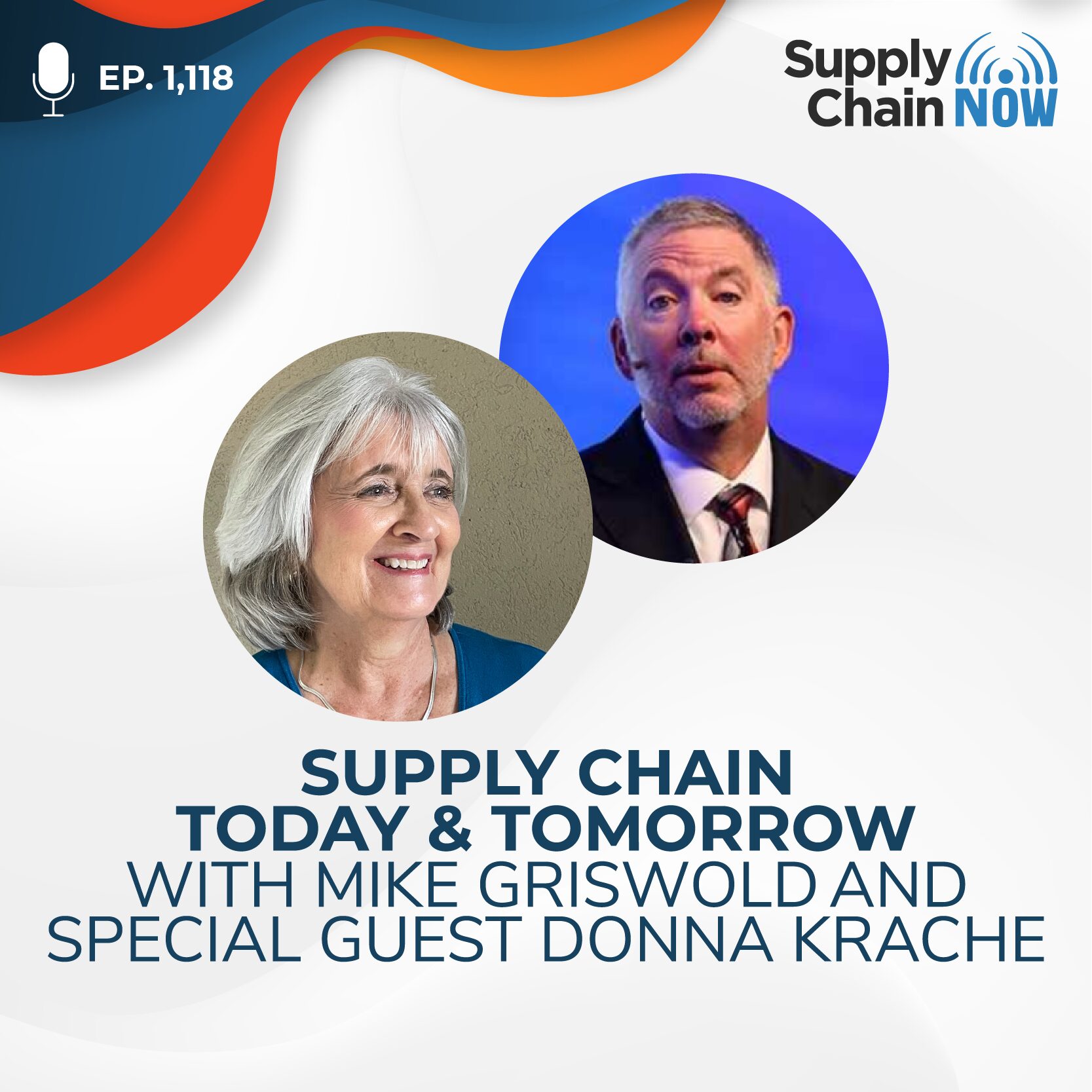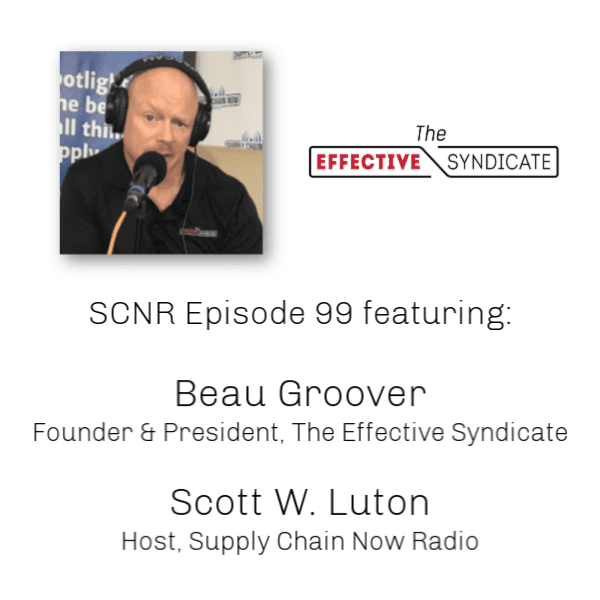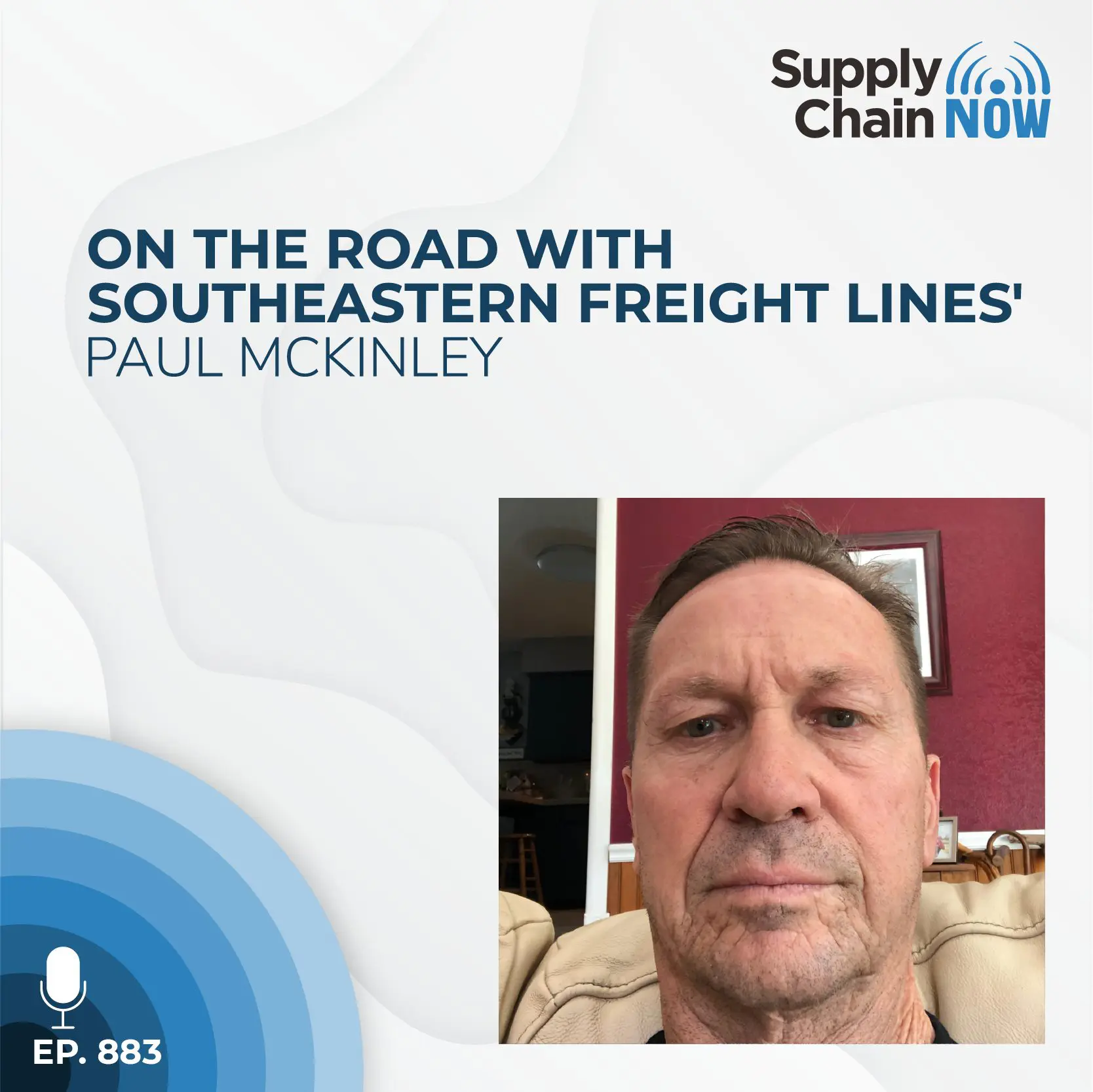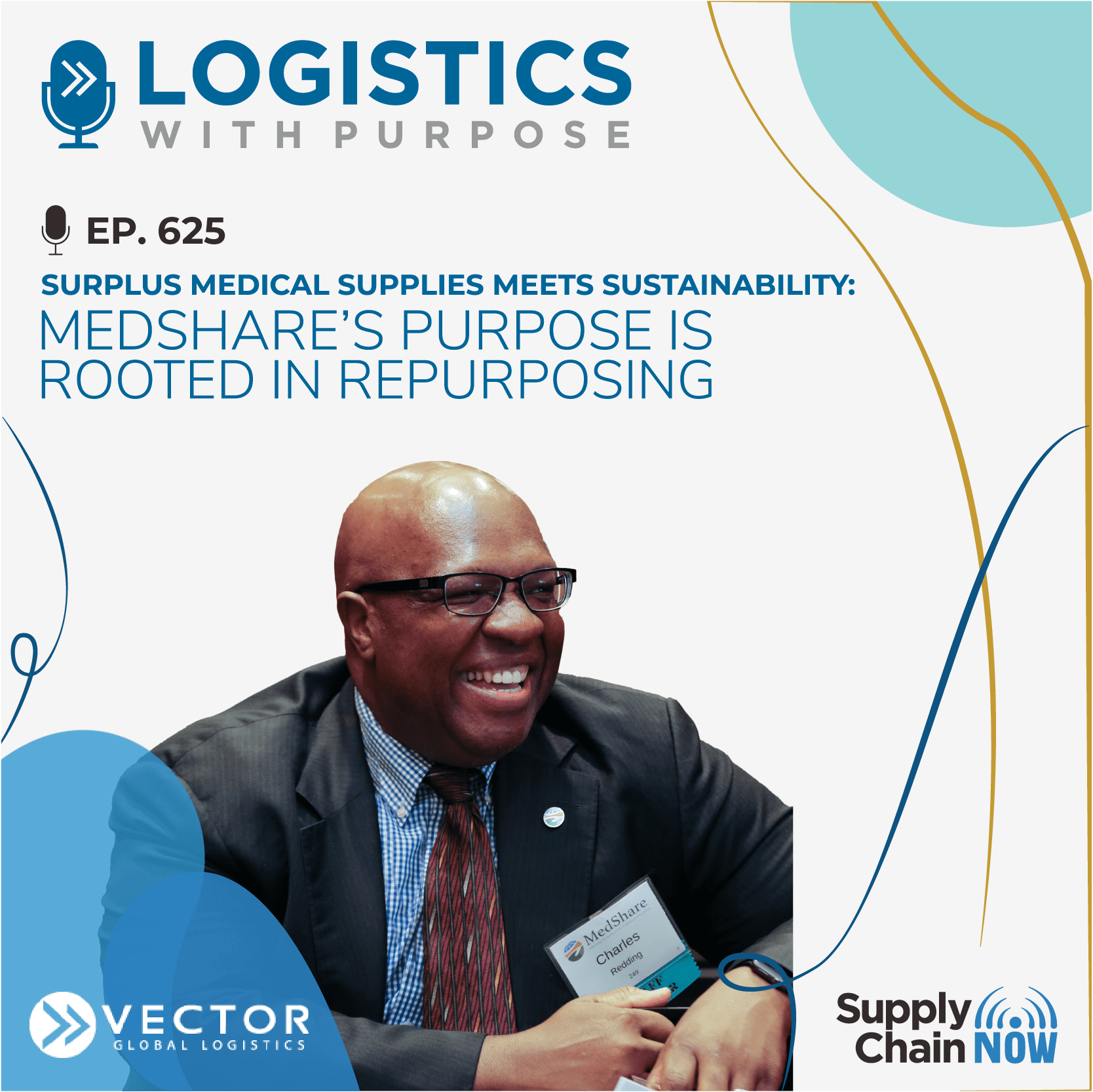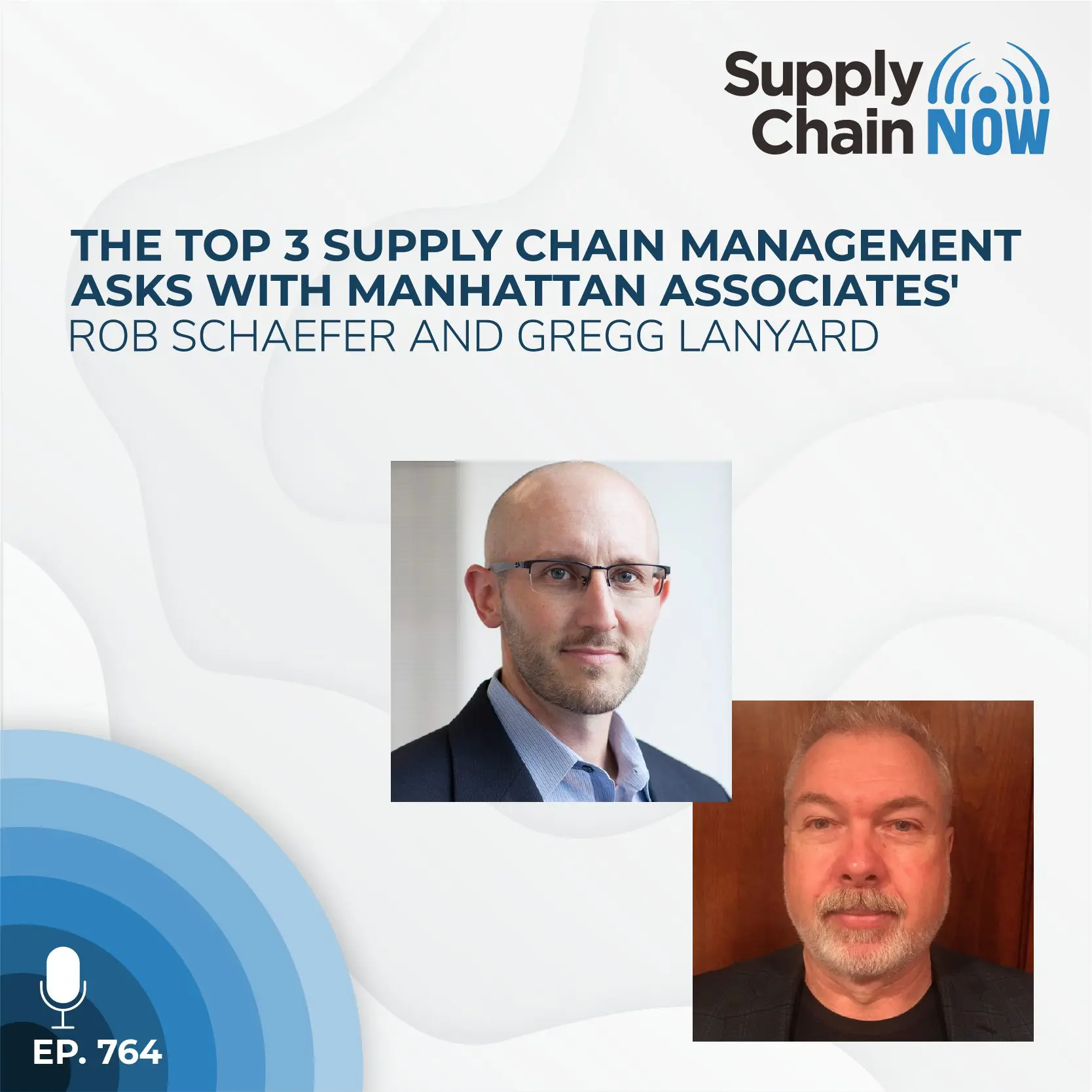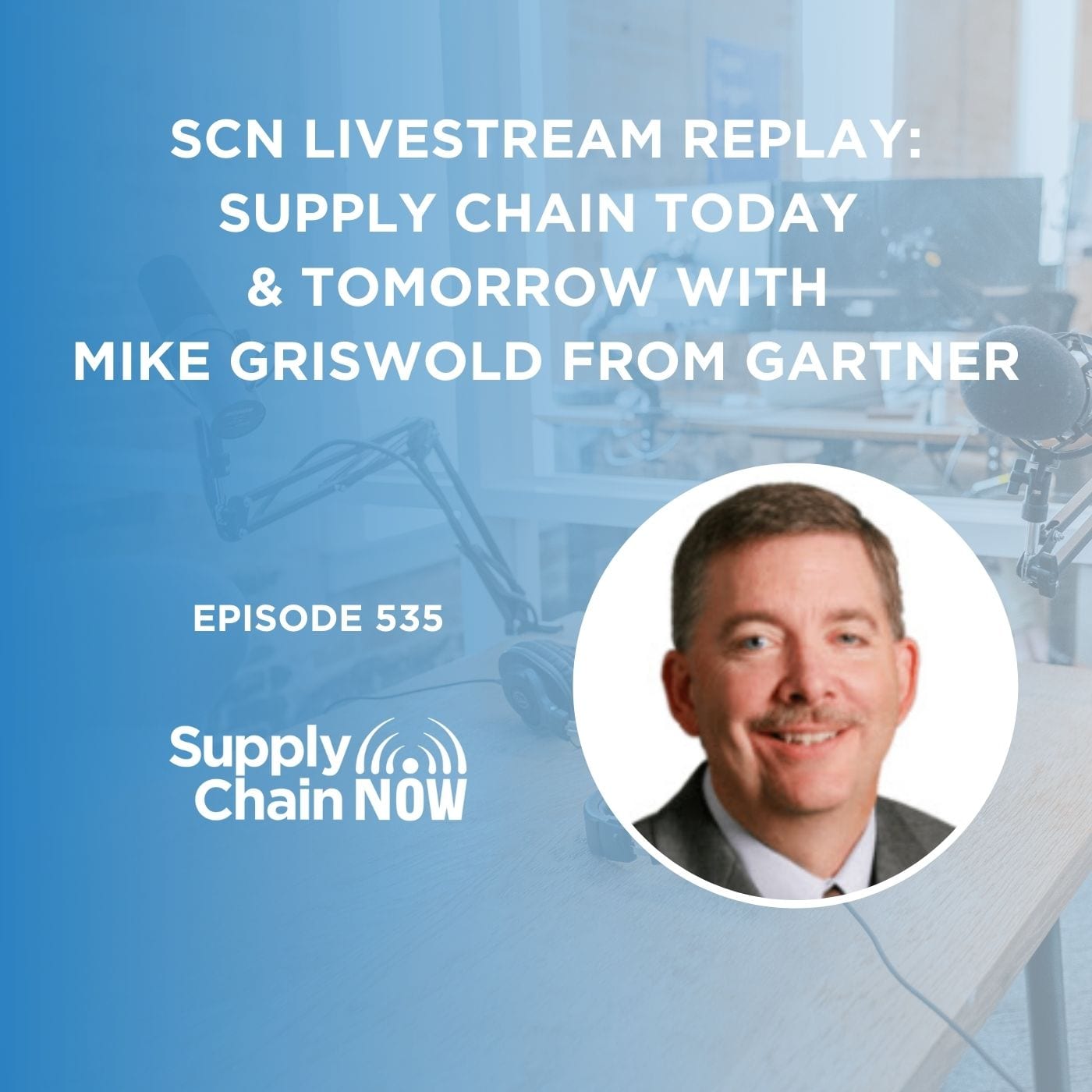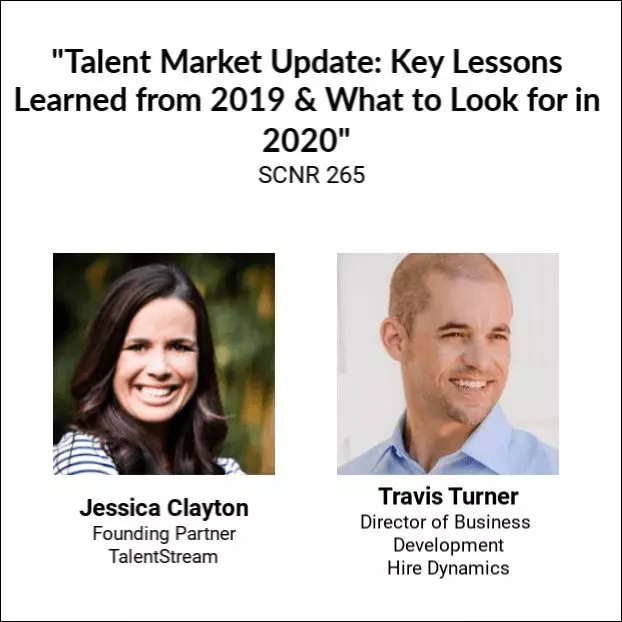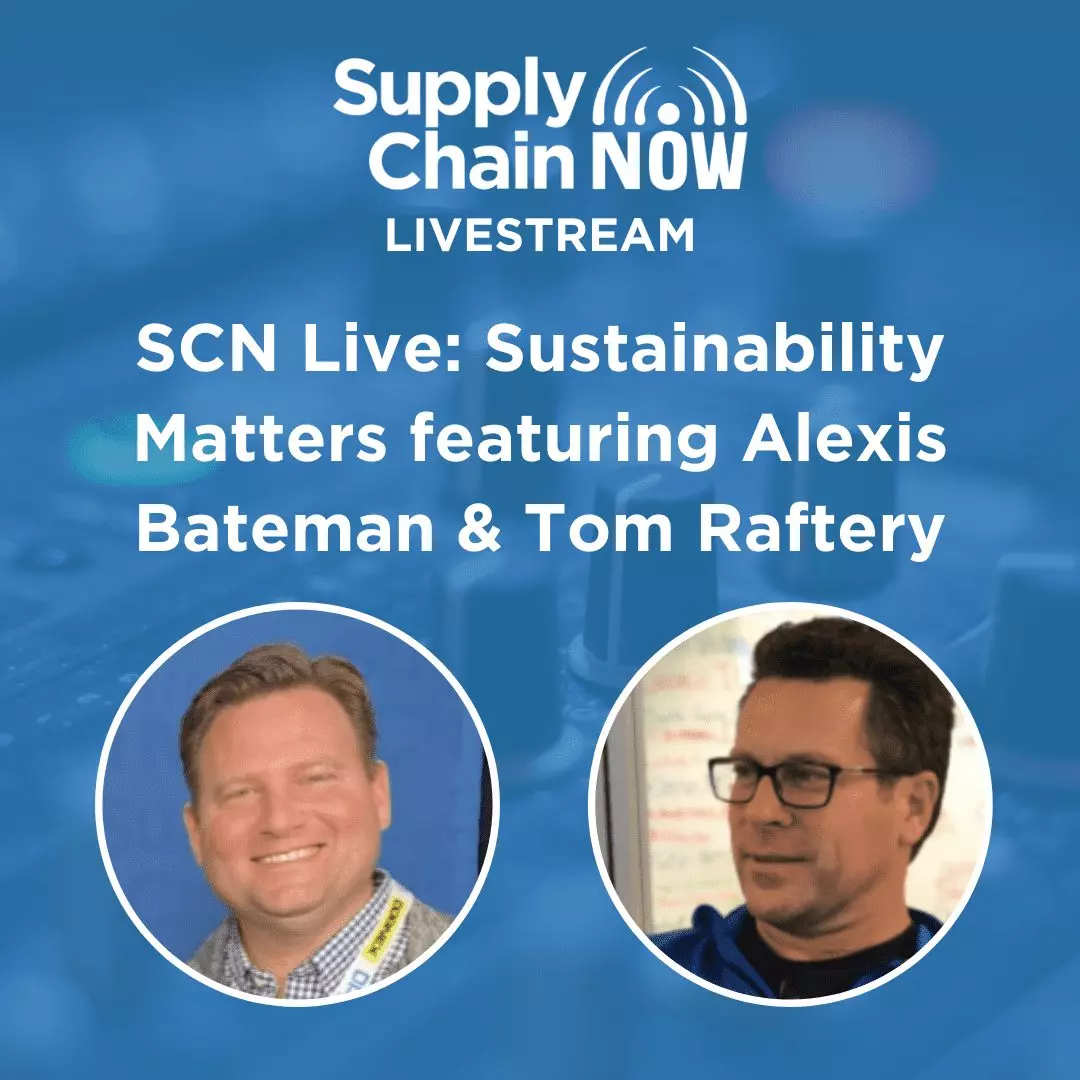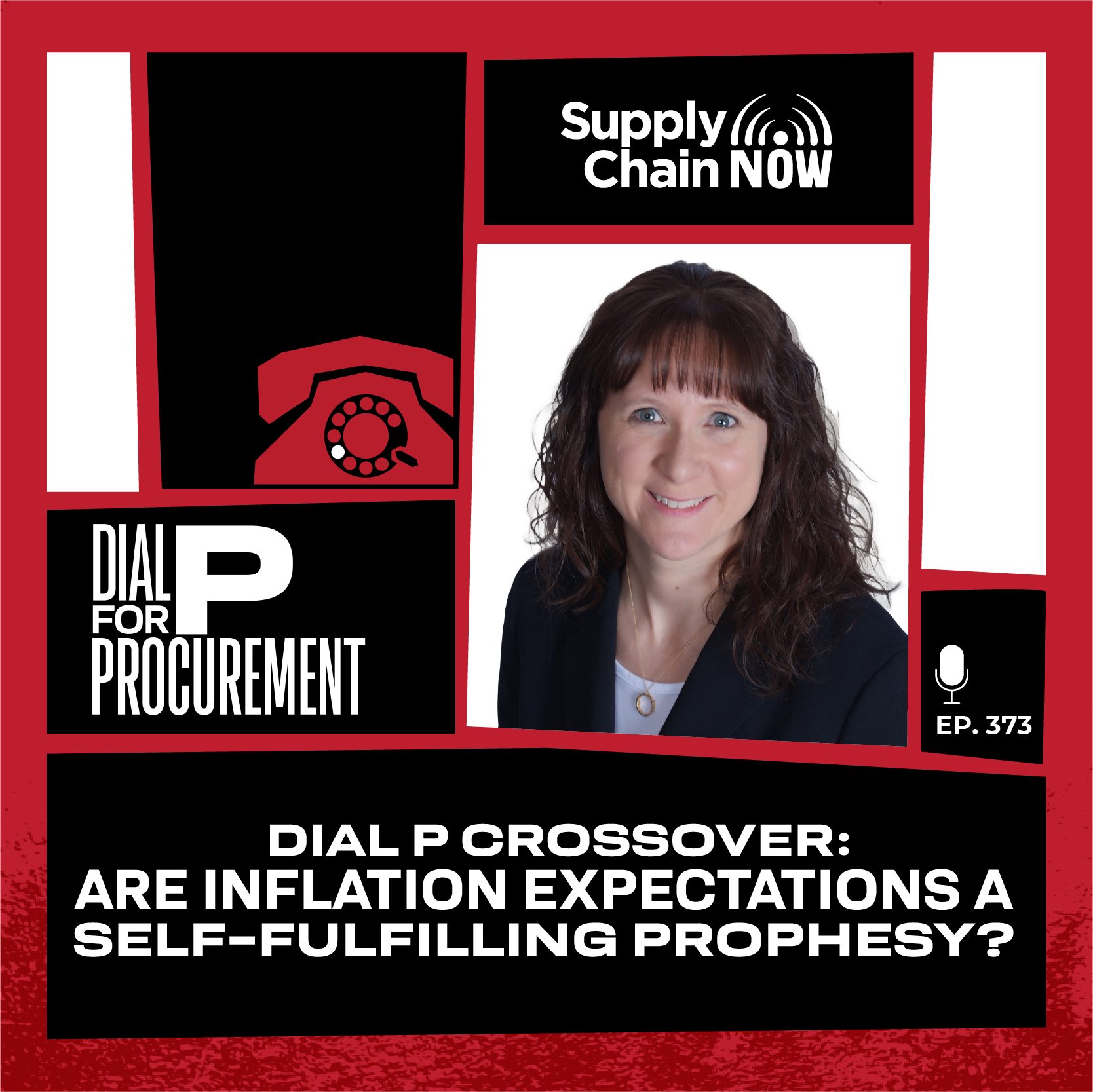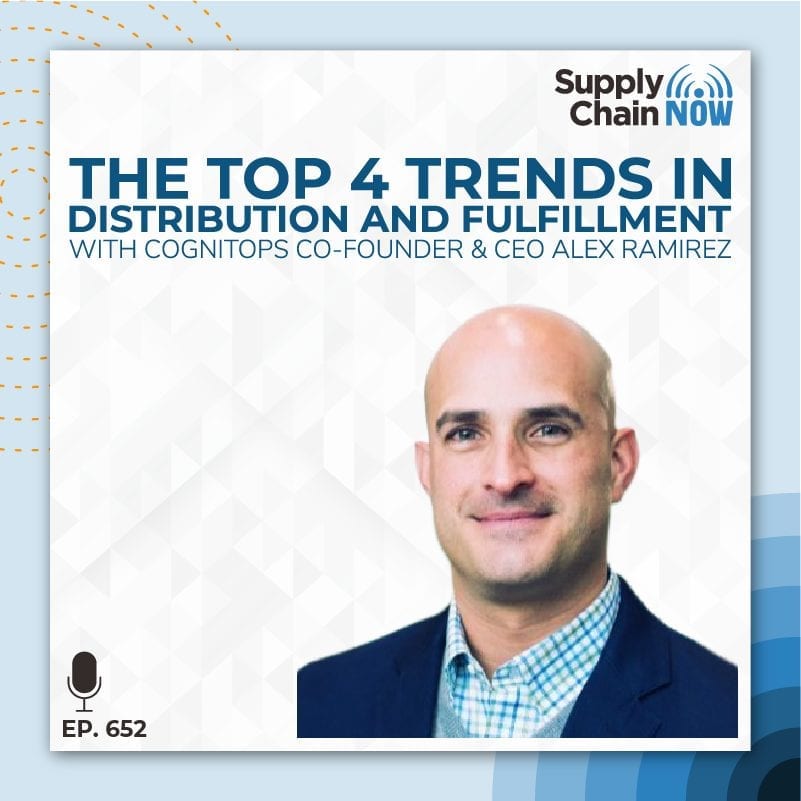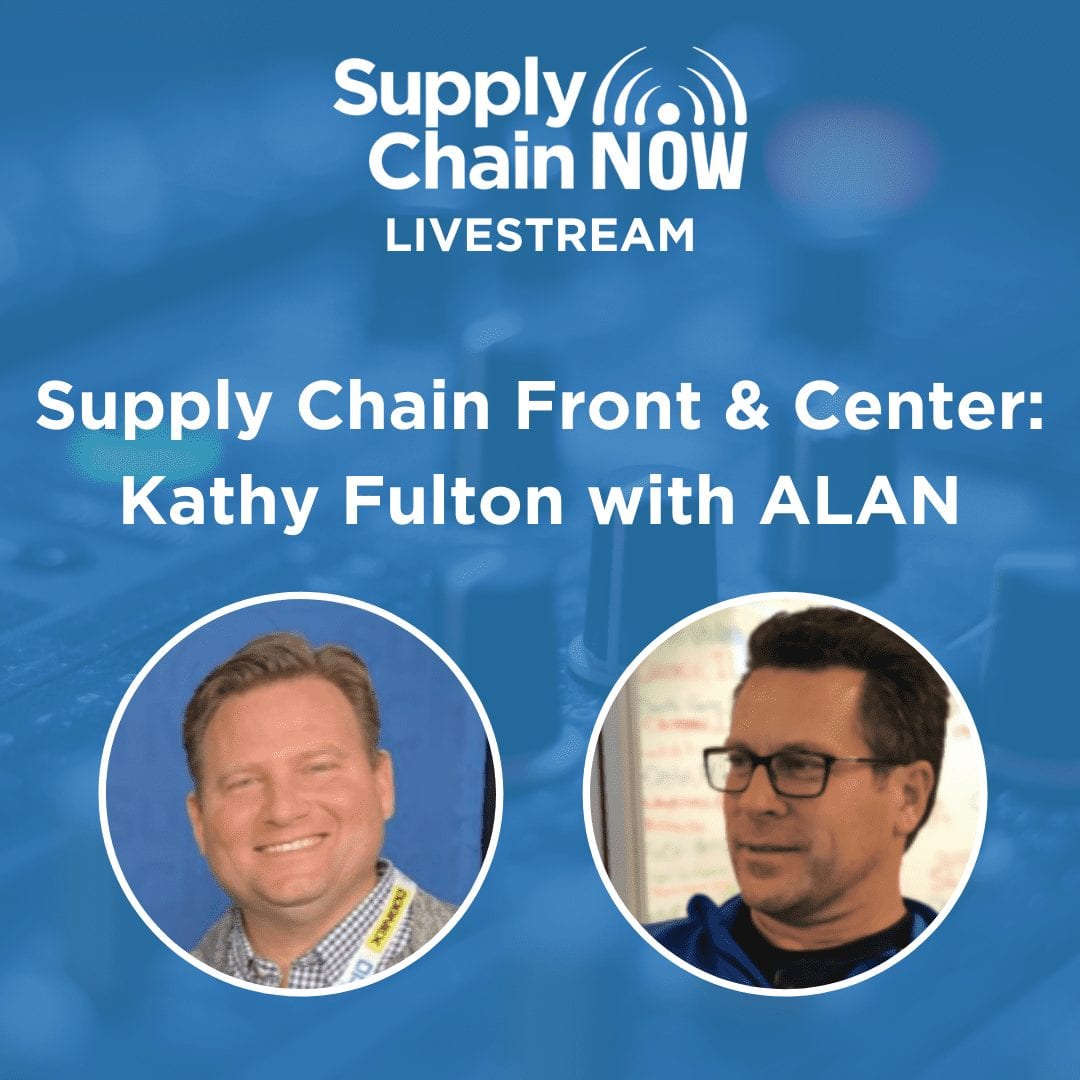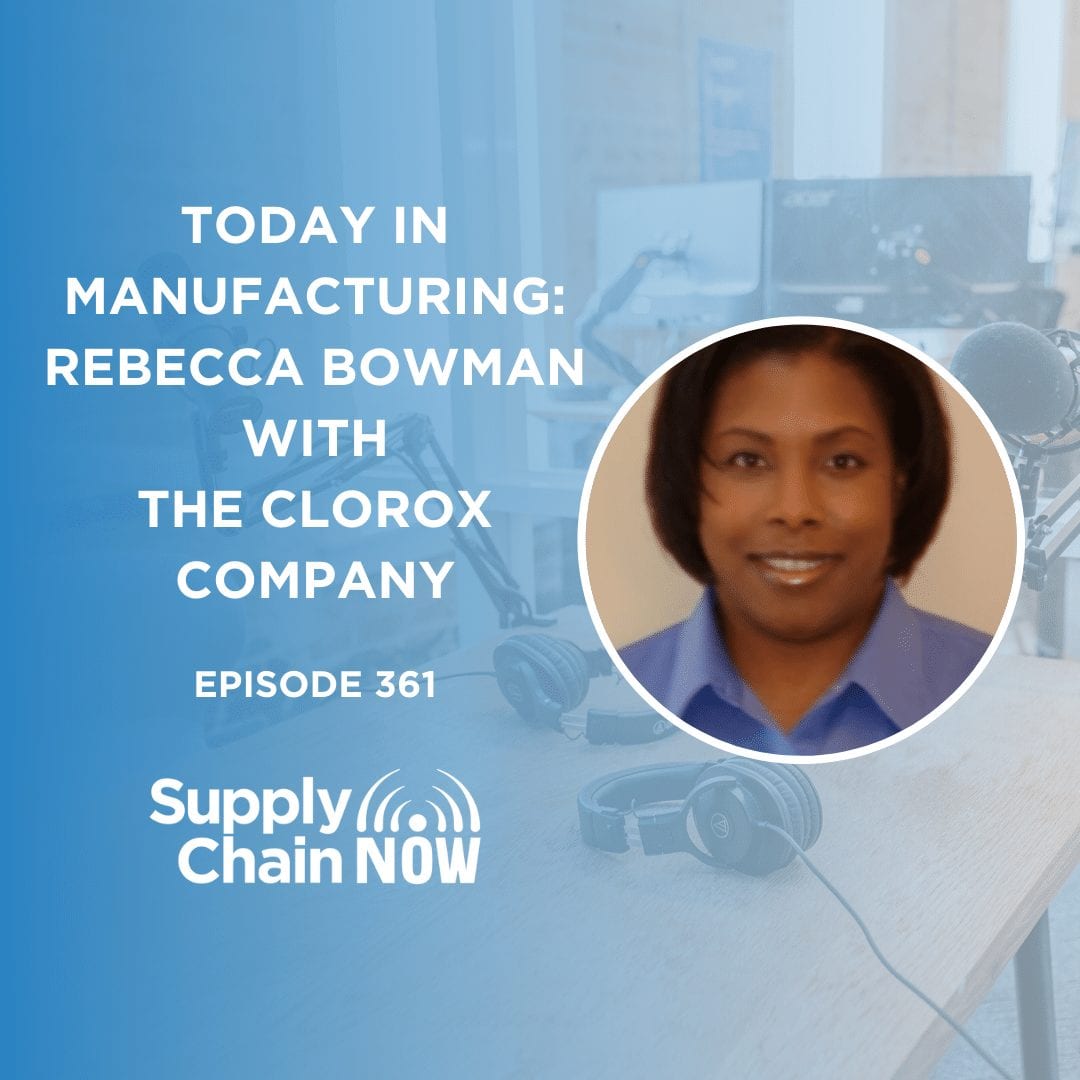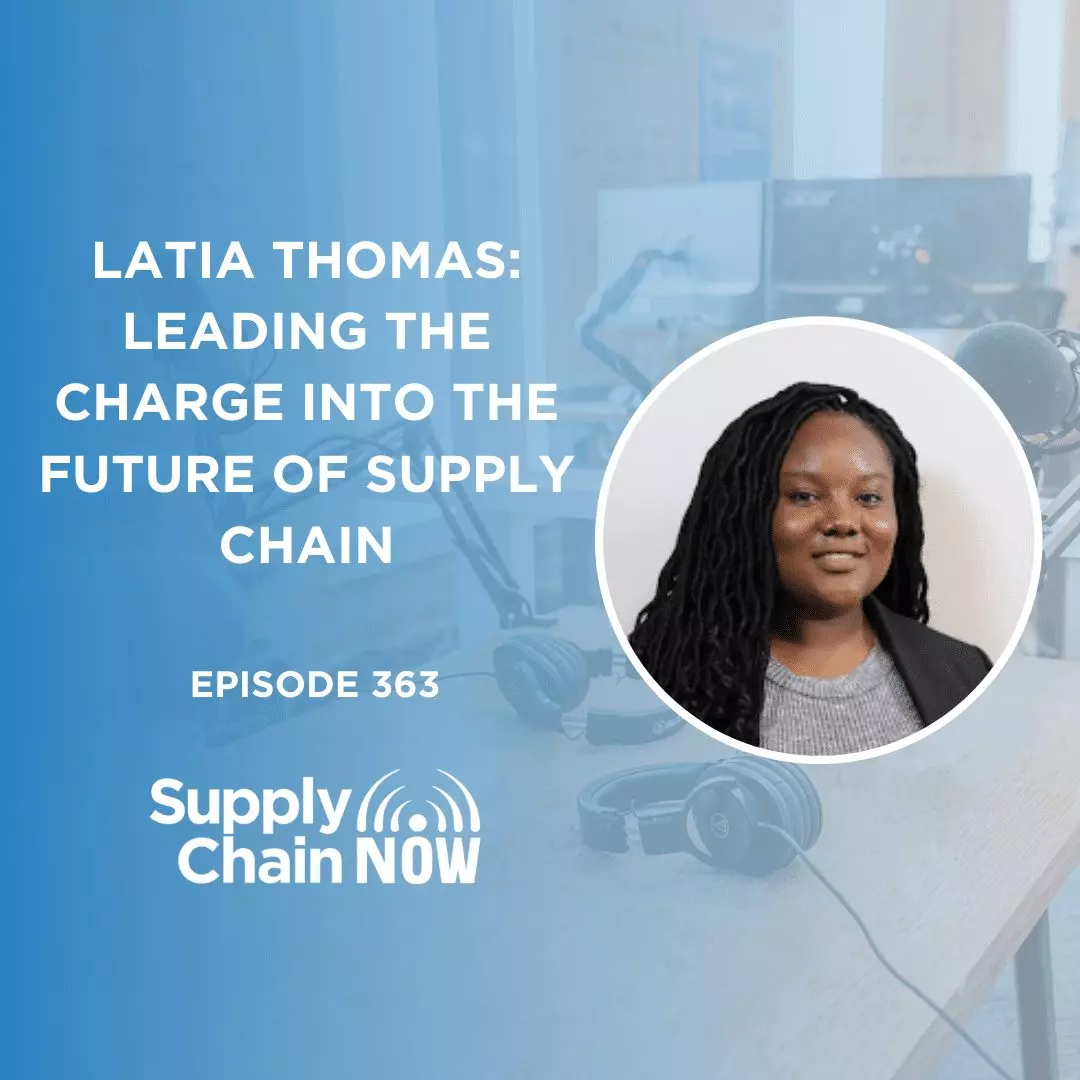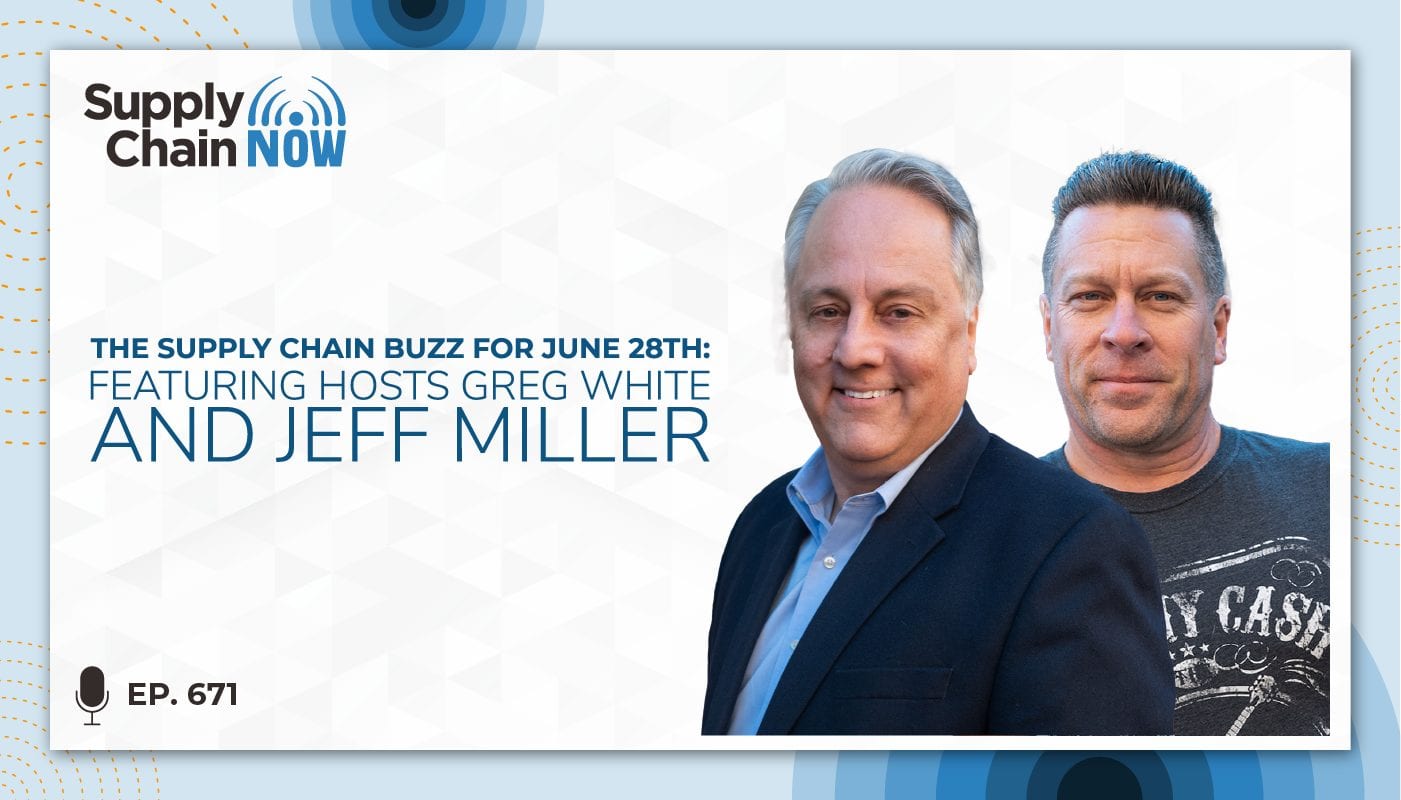
Episode Summary
In this episode of the Supply Chain Buzz on Supply Chain Now, hosts Greg White and Jeff Miller discuss the top news in supply chain for the week.
Episode Transcript
Intro/Outro (00:03):
Welcome to supply chain. Now the voice of global supply chain supply chain now focuses on the best in the business for our worldwide audience, the people, the technologies, the best practices, and today’s critical issues. The challenges and opportunities stay tuned to hear from those making global business happen right here on supply chain now.
Jeff Miller (00:31):
Good afternoon, Greg. Jeff Miller in for the vacationing Scott Luton, Greg White. Welcome to supply chain now, how are you doing Greg? I’m doing great. It’s good. Hey, it’s good to be back home again. I’ll bet. I’ll bet. Welcome today. Today’s livestream Greg. It must’ve been a blast out in Wichita. I enjoyed seeing the pictures, the LinkedIn posts, uh, uh, must have been a fantastic visit Groover labs and to Wichita state. Yeah, it was. I have seen the future of supply chain in Wichita and it is good. So they’re making a big commitment to both technology and supply chain at Gruver labs and at Wichita state. So it’s going to be really, really interesting. They’re building an entire digital transformation campus or campus building and supply chain is a big, big part of that. So got to talk to the president for the first time, not apologizing for something.
Jeff Miller (01:28):
So that’s a surprise, but yeah, always, always good to talk to administration and not be apologizing, something of which you have a balanced scorecard. I suppose you could say that. Yes, that would be a fair, fair assessment. So, well welcome. Hey, it’s good to see you, Scott. Of course the boss is off on vacation and we’re going to, we are here. We are holding down the Fort, so I’ll do my best. I appreciate Scott, uh, giving me, uh, the chance the rains. I hope he is enjoying his well-deserved vacation and uh, let’s see what mischief you and I can get into today. Looking forward to, uh, Greg. Yeah, Mike was, let’s say a little, some of our guests here in participants. Um, David. Hello from the road. So David’s on the road traveling. Good to have you here. I wonder where he is. Let’s hear about it.
Jeff Miller (02:22):
Maybe we’ll tell us right Peter. Good afternoon. Good to see you. Hello. Sushil let’s see. We’ve got a few new folks here. Yeah, we do. I’m looking at, see here just to be you Mohib so same, same comments to you. Mojica was great to see you. You look like you were having a ball with Greg and the folks at Wichita state. Yes, yes, yes. We know you’re a shocker. We got it. Hey, he did a great job putting this together. So we met with, um, [inaudible], uh, which is an aviation research Institute there on campus. We did a great campus tour with Gerlach. Who’s the VP of innovation tech. And what do I want to say anyway, getting, getting tech into the marketplace. Um, and Deb Franklin gave us a great tour of nice car and, uh, Kurt from Gruver joined us. It’s a really amazing facility.
Greg White (03:18):
In fact, with your, with your knowledge of AR and VR and all of that sort of thing, I think you would have really, really enjoyed it. We got to play in a VR environment inside an aircraft virtually inside. Pretty cool. You know, it struck me when I, when I saw this and we’ll get back into welcoming our guests for in just a second. And participants is, is there such a, a strong core capability in aviation, which in many areas has for decades led the way in model based engineering model based design. And, uh, it’s just, I think this is a consequence of being in that, in that location, right? The world capital world air capital, it is for a reason. So, uh, absolutely no doubt high memory. Nice to see you today. Glad you’re here. And I’d like to welcome a special first time, first time participant, um, from this side of the screen, a gentleman named Scott Ludin Ponte Vedra.
Greg White (04:12):
I’m going to have to look, look that up and see, I mean, what I’m wondering, I’m wondering Jeff, if he’s talking about our mischief or his, because he’s at the beach and I saw that he already has his canopy up and I saw that so perfectly maybe getting his buzz on in a couple of ways. So I hope that he is, he’s definitely earned it. Absolutely, absolutely. So glad, glad you dialed in Greg. Thank you. Uh, let’s see, Sheldon rose. Good morning. I hope you’re doing well today. Yeah. Good to have you back, Nick. We haven’t done anything yet. So thanks for loving this today. We’re glad that you are, hopefully we’ll retain that over the next hour or so. So yeah, well, I want to do a couple of things here, um, right up right up front. So a couple of calendar and scheduling items.
Jeff Miller (05:04):
I am really looking forward to this. Uh, I’m a huge follower of Kevin and the work he’s doing now with digital transformers. And I think this webinar with Dr. Swank and Nick, uh, from escrow, this is going to be a fantastic, uh, webinar. I’m looking forward to it because I think we’re only now beginning to scratch the surface on what digital transformation can do for the supply chain. And a lot of quarters, digital transformation is becoming a little bit thread worn. It’s, there’s a little bit of digital transformation fatigue, but I don’t see it here. And I think, um, there’s so much that we can do at a comparatively low risks and low costs and rapid returns and, uh, every week, uh, Kevin’s got something going on and this webinar I think is going to be a fantastic addition. So I’ll think about opportunities that we capitalize on.
Greg White (05:51):
I think you’re right. I mean, you know, there, there’s a difference between saying digital transformation doing it and folks like Kevin, um, you know, they really actually get it done. And I think we have to acknowledge that digital transformation is not moving from spreadsheets to tech or electronic spreadsheets. It’s, it’s really, um, defining your business in a new way and enabling it with technology and then guide even guiding processes with technology. So it’s, it’s a holistic transformation really. Um, but digital is at the core of it. Absolutely. Um, I’m fond of saying, and I guess sometimes we date ourselves when we say things like this, but I’m of a career generation where we couldn’t do some of the things that now today are table stakes. We wanted to, we knew what we wanted to do and try to accomplish, but the technologies were either prohibitive or didn’t exist.
Jeff Miller (06:47):
And to see now this, uh, this rapid acceleration of technologies and their valuable application that’s to me, the key is getting stuff done. And so this’ll be a good webinar looking forward to it quickly must be a gen X-er because I think our entire generation has kind of felt that way. We always felt like there was a new and better way to do it. Technology wasn’t quite there. I think a lot of people in our generation pushed it that direction. Um, and we’re starting to see the fruits of our labors and it’s good. It’s really good for business. And you know, again, Kevin, um, driving so much change, no trip from so many angles, he works with so many companies. It’s incredible. The second thing I would make sure you have this on your calendar, uh, is Loris a series annual conclave of this is an invitation only a thing of a supply chain innovators and a supply chain now is the exclusive virtual host.
Jeff Miller (07:46):
So put this in your diary is it’s out of why is it’s since September, but, um, you know, Laura Siri, well, you know, her leadership over the last 20 years is through supply chain insights for business. Uh, she is a muscle listened to must see kind of individual in terms of her perspectives on the industry. And this conclave for lack of a better term is, is her annual meeting and, uh, more details to come, but make sure you put this down in your diary and you’ll hear more about it in the coming weeks. This is an exciting thing for us here at supply chain now. And, uh, we think it will be very valuable to us and to all you are participating, Greg. Yeah, she always, she always gets together the best practitioners in the industry. It’s a pitch free environment. You won’t have to endure a pitch from a service provider or technology provider like me.
Greg White (08:33):
Um, but you will get a ton of incredibly valuable information to be able to, uh, communicate with and, and actually network with peers, get some great ideas and see the reality of, you know, as we talked about, like with digital transformation, see the reality of what’s being said, versus what’s being done, how Laura and her team are pressing organizations to do more than to say more. And that’s, what’s so valuable and you can save yourself three or $4,000 by, by watching it via the, um, the live stream. If you can’t get there or, you know, can’t get that kind of budget for airfare and hotel and all of that. It’s a great opportunity to get engaged here and learn a ton from practicing professionals. Absolutely no more, uh, welcomes. Uh, I wanted to catch this one from Mohib, um, 3,300 plus views on the post.
Jeff Miller (09:34):
And there’s a link there for more information. So, uh, again, fantastic, uh, event. They’re both at the Groover labs and at the campus. And, uh, I know, I imagine most of your, probably your feet haven’t touched the ground yet. So you would be hard pressed to find a more dedicated shocker than Mogi for sure. Um, you know, I really enjoyed spending the afternoon with him. I’m sure. I’m sure. All right. Well, let’s jump into, uh, the buzz what’s happening, uh, in the last seven days. And, uh, I think there’s some interesting things that are going on here. This one caught my eye, Greg, um, CVRE of course, is a well-known, uh, real estate investor operator, commercial properties. And, uh, they just issued a report that, uh, we’re going to need 300 million square feet of warehouse capacity in the next two, three years or so four years, arguably to meet growing demand of e-commerce.
Jeff Miller (10:27):
And this struck me as interesting because it’s, it’s a significant prize, 26%, uh, worldwide. It’s a, it’s a notable component, so billion and a half square feet so-called, uh, warehouse space worldwide. What, what caught me though in particular was that they’re talking about omni-channel so it’s not just traditional distribution centers and that provokes a whole different line of thinking in my mind, if, if they’re saying we need this much more fulfillment warehouse space for purposes of fulfillment, I wonder what does this mean to continuing efficiency improvements in distribution and logistics? That’s just an enormous addition to what we already have, and it’s largely going to have to be constructed, especially for these omni-channel facilities, uh, requirements. Yeah. Yeah. I think, you know, the immediate thought was 330 million. That was exactly what went through my head. And I thought there has to be some alternative. And unfortunately, fortunately there is because the, in an omni-channel or, or each fulfillment facility about 75% of the, of the square footage is wasted.
Greg White (11:36):
And there are now all these automated retrieval and storage storage, and retrieval systems out there that can make it much, much more efficient. So I’m hopeful that instead of buying more real estate companies buy more, more productive and, and more, uh, accurate picking systems like these automated storage and retrieval systems and reduce the amount of space. This is probably a little bit of hopefulness Jeff on the part of CVRE and other commercial real estate agents, because they make more by selling more square feet, but there is no doubt that we need more fulfillment facilities. I mean, Amazon has since 2014 been building out a global network of fulfillment facilities and they’re not slowing down. In fact, they are accelerating to do so, but I think things like there’s companies called, I think one’s called Cardax and there’s AutoStore, and there are other solutions out there that can literally make 100% of the space act, uh, um, usable for picking and sorting.
Greg White (12:45):
So hopefully we use some, some automation that reduces the amount of footprint that these, these plants or these, these fulfillment facilities require and increases the throughput and accuracy at the same time. I think that’s the key. And that was, uh, was what I found missing in, in the article. And I think you’re you’re right. These CVRE certainly has a perspective based on what it does for a living so to speak. But there are a lot of companies now that are applying route management, as we know inside the four walls, it really sophisticated versions of that, that create more, much more dense cubing and much more dense, uh, ability to retrieve and package. And just seemed like this ignores that because those gains, I don’t have the name of the company in front of me. It’s a Swiss Swiss, something that is involved in these retrieval systems of small robots.
Jeff Miller (13:36):
And, um, now some level of automated pack, as well as automated pick. And they’re talking about improvements in the 10% year, over year as a starting point for efficient operations. And I wonder if that’s factored here, uh, this also kind of influences where you, where you place DCS and, and what the, whether they’re truly omni-channel and who’s actually being fulfilled. I think that’s going to drive a lot of the need for the technology you’re talking about traditional pick and pack operates one way. This seems much the need is much different now. Yeah. And I think I, you know, another thing that I think I’m an old retailer, Jeff, so I feel, um, I feel free to say this. We retailers need to recognize that we’re great at merchandising product development, product selection, marketing, we’re not great at logistics and supply chain. And one of the things that we can do to be both more effective, much more cost-effective and reduce the amount of wasted space in these kinds of facilities is to go through specialist type organizations, three PLS or fulfillment, uh, you know, they, they have E forward distributors, all sorts of, you know, whatever, whatever, um, it takes whatever the, you know, uh, shape it takes in a particular marketplace.
Greg White (14:52):
But I think that that will create a lot of efficiency that will eliminate a lot of unnecessary real estate space. Yeah. Yeah. Right. And you can see it happening as new retailers, new direct to consumer retailers and new, um, mass retailers come online, they are going directly to those kinds of solutions because they recognize what they’re really, really good at. Sure. And, you know, like anything, the pendulum will swing back to self fulfillment at some point, it, you know, unavoidably does. But, um, I think if we recognize what our real gifts are, we can, we can consolidate our goods with the neighbor’s goods and have somebody else help us get those to the consumer. Exactly. Exactly. Yeah. I’d look for, uh, please weigh in here. What are you seeing in the market? And Peter, thank you at air Canada. We had a robot retrieval system installed in 1995 and, uh, many and maxi loads.
Jeff Miller (15:51):
So, uh, he says it’s saved us thousands of square feet of warehouse space exactly. To your point that when these, and this is of course, uh, many generations, uh, older technology back in the nineties, but it made a difference then, uh, especially in, in critical parts fulfillment, like, uh, you know, field availability services, kind of a thing in aviation, of course, that’s, that’s critical AOGs aircraft on ground and so forth being something to be avoided. So these I’m sure paid for themselves very, very quickly. Yeah. There, there have been so many of these efficiencies. I think finally technology has caught up to allow us to democratize it somewhat, right. I mean, you had to be a big airline to, or, or a big organization to be able to afford it, but now it’s sort of an every person’s type solution. So let’s move to the next story.
Jeff Miller (16:42):
Because on the one hand we see a perspective taken by CVRE and maybe some others that we’re going to need to see growth. And then we see that, and this is not an, not a new topic for you, Greg. Uh, tell me what you really think about this. Uh, there was an article in, uh, the logistics report, uh, from Jennifer Smith talking about again, uh, the regionals, these small small companies and what they’re doing. And it was a, it’s not exactly top line news, but it, again, it caught my eye because these companies, uh, the, the laser ships, uh, for example, they’re growing on the basis of expansion. So if you take the pizza metaphor, they’re not stealing somebody else’s slice of pizza. They’re just partaking of the expanded pizza, if you will. And the growth here is such that these companies are saying they’re able to see profitability when they enter a new region within a small number of months.
Jeff Miller (17:33):
And I just think that’s about the infrastructure that gets set up. If you’re going to be a regional package carrier and distributor, or do we last mile where you’re picking up from somebody else and in either case there’s infrastructure, hiring assets and so forth, and to be able to become profitable this quickly is notable. I think this, this continues to be a consequence of the bigs being sold out largely capacity needs. None of the big three are saying, they’re going to take on new major shippers between now and the end of the year. And in fact, in the article, LaserShip said it also in some of its markets is not taking on any new shippers between now and the end of the year it’s capacity, that’s committed. But again, it just struck me that, uh, there’s room for growth in this industry. And I think Greg, in the past you’ve you said, look, this is, uh, there’ll be more coming, more comfortable, more participants coming.
Greg White (18:21):
Yeah. Well, I mean, you know, obviously that the bigs as you call them, I love that Jeff, by the way, the bigs have decided to stand their ground. And in fact, take advantage of their advantage position and up rates. And basically even the new CEO at ups issued her, let them eat cake statement, um, you know, to those who, who, uh, feel put out by the, uh, the, the increase in fees. And of course, when you, you know, when you take that stance and you decide to serve as a limited amount of, of companies and you do so at a premium price, there’s always opportunity. And as you said, and I can’t remember who you said, said at first death comes from below, right. So grow into CEO of, into Andy Grove. That’s right. So, um, you know, and I’m not sure that this is necessarily a threat because these are markets and customers that the bigs have, have, uh, chosen not to do business with, but it’s a great opportunity.
Greg White (19:22):
It creates a great foothold and even, and if the bigs decide to get into this business, it creates a great acquisition path for these companies, right. And I’m encouraged, honestly, I missed the part where they are profitable in a relatively short time, because with all of the fees that are added on by ups and FedEx and the, like, I was beginning to wonder whether it’s, it’s unfeasible to do, um, ship to consumer at the level that we’re doing it, or if the bigs were really just taking advantage of their market position, it sounds like it’s the ladder, which is encouraging because if we can get stuff shipped for less to consumer, then that means e-commerce remain e-commerce and direct to consumer commerce remains feasible. And that’s an important part of our economy obviously, and growing at a rapid rate as we go into the future.
Greg White (20:19):
So it’s encouraging to see that you can make money without charging these exorbitant fees. The question one of among many questions that it raises in my mind is what do the distribution networks look like when you have a company like lone star overnight, which had been operating only in Texas and Oklahoma, and now it’s Louisiana, Arkansas, Missouri, Illinois, and Kansas. And if they penetrate those markets to the same level that they penetrated the Texas market, does that have a fundamental on where companies, um, place distribution centers, where retailers decide to position their goods, these are not independent of one another, and I’m a, I’m a student of networks and wondering how these parts call come together because in the, in the big economic picture, you’d want to know what the fulfillment capabilities all the way to last mile look like in certain areas, not just in the big air, big municipalities, but population centers, uh, you know, in the second and third tier away from big municipalities.
Jeff Miller (21:15):
And what influence will that have on this additional 330 million square feet? It’s an interesting question. I don’t, I don’t think the, uh, the CVRE answer is necessarily locked in stone or written in stone. Yeah. Uh, you know, interestingly, I had a, I had a personal observation of, I haven’t lived outside of a major cities, um, you know, metropolitan area for a long time. And having been back in Wichita, we were ordering a gift for someone who had done a good deed for us in Wichita. We ordered it on Friday, I believe, and it just arrived on, on Sunday or Monday. So today, so I, you know, I guess we, we, in, in big areas, we’ve been insulated from the fact that two day delivery isn’t necessarily a reality for everyone, for everything. I mean, in Atlanta, New York, LA, where, you know, wherever you can get two day delivery on just about everything, but not everyone can. And this, someone taking this sort of regional specialty to provide that service is, uh, could be, that could be yet another method of disruption. If we set that same expectation in some of these rural areas or smaller urban areas around the country, Larry Long says, it’s good for the economy where we can match buyers with sellers and perhaps decrease the strain on the bigs. I love that.
Greg White (22:47):
Let’s, that’s good. That’s good. Let’s release the strain. I like that. Um, yeah, and I, uh, I am wholeheartedly in your camp. Let’s re let’s decrease more strain on the bigs and give them some opportunity to sit back and reflect a little, I don’t know that they will, but okay. And we’ll give that, uh, what, uh, tell us what, uh, what you, you say to folks that are on the, on the stream. What are you seeing and, uh, in markets that you operate in, then you are companies that you either buy or buy from sell to, uh, what are you seeing and what do you think is going to happen is we see all these different technologies for last mile, different players showing up, uh, here in the, uh, in the area, in the Atlanta area, we see a laser ship, we see a handful of others.
Jeff Miller (23:35):
And we, sometimes we see companies that we haven’t seen before. So we know there’s growing market here. It’s not just seeing prime, prime vans running all over the Atlanta city and suburb areas. So it’s, it’s dynamic. And I think, like you say, Greg it’s because there’s, uh, the growth in demand is outstripping the supply in terms of infrastructure and capabilities among ups, FedEx, DHL. Yeah. We just saw a new unicorn anointed to bring with the couple of couple or three GS, um, just took investment. And, um, I don’t remember exactly the valuation, but more than a billion dollars. So there you go. And you look at a number of these companies participating in, you know, as you talked about micro fulfillment or regional fulfillment, or, um, taking, taking the Biggs head-on and last mile, um, there’s, there are already some significant successes there. So, well, anything that will serve to improve that and improve omni-channel I used to be, as I think we all, we all have experienced you order something and it’s designed to either be in store or be to arrive at the store, or you can pay a little more and have it brought to you.
Jeff Miller (24:44):
And a very often the fulfillment, because it was coming out of an in-store fulfillment capability somewhere else didn’t work really well. That seems to have improved over the last year. Omni-channel is definitely working much more efficiently and effectively. And if that’s where these investments are going to go, that’s great. Let me see what happens over the, over the coming year. I can’t believe we’ve been on here this long and you and I have only agreed something’s wrong with the universe, Jeff let’s, uh, we’ve got a few more stories to go and the good, so we’ve got more opportunities.
Jeff Miller (25:14):
I didn’t exactly a watch. Um, we tie or any kind of martial art, but I was prepared for this meeting today with you anyway. So let’s go on. So continue kind of in the same theme of what’s going on with respect to the movement of goods. This one’s a different angle. This is a reassuring again, another topic we’ve talked about a lot on the buzz, and we talk about, we have, we have other sessions that you talk about it with other guests run around, and this one is on paying a lot of attention to as well, because I think there was this, um, knee jerk might overstate it, but there was a strong reaction during COVID because of the dire disruptions that occurred again, topic well explored by us on these, uh, on this air. Uh, and we’re seeing now that a reputable entity Thomas register or Thomas, uh, has done its 2021 manufacturing survey and says it’s, uh, that 83% of north American manufacturers are going to accomplish some level of reassuring or a committed to, I should say.
Jeff Miller (26:14):
And for me then the notable factors, it’s the same question they asked last year when 54% responded in the affirmative. So clearly there’s something going on. There’s not a lot of detail yet as to what that looks like when you perhaps have a strongly vertical supply chain, how much of that are you going to reassure reshore or are you for an example, an assembler of components coming out of the sub assembly industry, something that China effectively invented where you build modular things from standardized components, but, uh, it, it struck me again that part of the response to fulfillment difficulties to, uh, cycle times and perhaps the cost as well is to reshore and the article, uh, as, uh, talked about the study said that procurement officials or leaders in procurement are observing well, let’s, let’s not get too excited here because that’s not without risk.
Jeff Miller (27:07):
If you have a supply base, an inbound supply chain that can equally be reassured or cannot have any cool amount of risk removed, uh, it doesn’t really help you that much your fulfillment will improve. So again, this is kind of an interesting article because nothing operates in isolation from one another. And just saying that 83% of companies and manufacturers in north America saying that they’re going to reshore does not automatically mean we’re going to see better fulfillment. What do you think? Yeah, I agree. I think first of all, I think the hurdles to, um, reassuring are dramatic, right? Um, and in fact, I’ve worked with a company who has, who’s bringing out a new product and it’s a premium jogging stroller that could cost, I don’t know, upwards of 1500 bucks. And if they were to produce it in the U S it would have to be a $2,200 stroller.
Greg White (27:56):
And, and in doing a survey of their customers, of course, their potential customers, of course, almost no one, I think 2% said that they would, they would be able to afford, you know, or are interested in affording that cost. So, um, it’s a dramatic difference in costs. We have labor issues, not only the cost of labor, but the availability of labor. In fact, we do have many articles, as you know, Jeff, where we talk about people are, are staying away from manufacturing jobs in droves, um, because of the 3d, dark, dirty and dangerous that people perceive manufacturing to be. And, um, and of course, even automation is not necessarily the answer because most robotics are built and produced in China, right? So, um, it’s a difficult lift, uh, even, even building and, you know, even in the NAFTA region, Canada is right out, of course they don’t have the, the human capital to do it.
Greg White (28:58):
And the cost would be excessive there as well. But even in Mexico, I think is so much higher in costs than China, where, uh, a typical worker makes 13, 10 to $13,000 a year. Um, you know, it’s hard to compete with that. And then as you said, so many of the raw materials or componentry parts are, are built in China, even this, this stroller jog along, even their strollers. So many of the parts are made in China. They have to be shipped to Taiwan or Vietnam where they’re producing intending to produce, um, to even build it there. So it’s a lift. And, you know, I wonder how much of this is hand-waving because it’s a, it’s a interesting, or a hot topic, right. To, to appease either labor or the government or whomever, you know, they wish to wish to, uh, please with these statements, but it’s going to be very, very tough to do it.
Greg White (30:04):
I think for select products, it can be done. Right. And I think for some products it will be government subsidized, um, to, to do with pharmaceuticals and, and national defense type products and those sorts of things. Uh, essentially as, as we talked about though, I think the list of essential is probably should be broadened, but, um, yeah, it’s going to be, it’s going to be very tough, but I mean, uh, just opinion wise, what’s your thought? I mean, you have to be very close to this topic. I imagine, uh, on a, grab some comments here in a minute. And so people are now weighing, weighing in on this. My perspective is that in north American manufacturing, the reassuring, uh, drive is driven more by the outages, the bull effect that we saw consequential to COVID-19. Yeah. And it’s, it’s failing to recognize that a really short supply chain is not automatically the most efficient supply chain from an economic standpoint, as you just said, nor is it the most responsive supply chain.
Jeff Miller (31:08):
That’s the paradigm that I think I worry has taken hold among leadership. Some of, many of them in our industry that reassuring onshoring equals stabilization stability and improvement because they see 10 days of ships sitting outside long beach, uh, you know, or, or 15 day or, or people bypassing Humberg because it’s just too risky. I think Mariska said that there, there was a moratorium on Humbard. So I think it’s trying to solve their own problem rather than against easy to say this, looking at optimal sourcing or making the economics of product design management, such that you could dynamically move things within reason you can’t move raw materials around, but certain kinds of manufacturing lend themselves to a level of modularization. Then make movement of manufacturing from one contract manufacturer to another easier a lesson that’s been known in electronics and high-tech for decades. And I wonder if in more assembly oriented goods, more fabrication oriented manufacturing, those principles that have served the electronics industry.
Jeff Miller (32:09):
So well, uh, could be applied more broadly. And that would, to me be the offset to this eagerness of reassuring, which may not yield the, the results that people are looking for. So, yeah, I mean, it’s also, if, if the product is produced in any level of volume, it’s impossible. It, it takes a multitude of countries to even approach the workforce that China has exact, right. I I’d like to see companies moving more towards a, uh, diversification of vendors as opposed to diversity, which of course I’m for as well, but diversification of vendors where they have secondary sources or alternate sources for these products. So they’re not so sinked, sorry, that’s my, uh, my, I gotta take this it’s my, my car warranty, um, update. Uh, so, uh, so they have secondary sources for, uh, these, you know, for these type of products so that when something happens, they’ve got an alternative to go to.
Greg White (33:11):
And in many industries, they make a very specific practice of keeping a secondary source on the hook, give them 20% of the business at all times. Right? Yep. So exactly so that they have the ability to ramp up and they have the motivation to ramp up when you need them to. Yep. I think that’s a more reasonable approach rather than swinging the pendulum all the way, the other direction to reshore exactly as a, that, that won’t end well, and we’ll come back to Peter. Totally agree. Set aside cost to produce reshoring will continue to rely on raw materials that are not readily available located within the north American marketplace. Yeah. Sheldon last mile is definitely impacted by local network effects and localized demand for service delivery. When you live in these remote areas, the bigs service levels don’t apply to you. You want to know how locally, how soon can I get my stuff?
Jeff Miller (34:05):
This leaves the way for local competition. And these guys normally have local knowledge and connections that may be better source. That’s a great point, Sheldon. Yeah. Well said, well said that’s so true. And that may be the secret sauce to some of these, um, regionals, uh, that have, uh, in, in terms of making the ROI more, more rapidly, uh, achieving a more rapidly, you get a good reputation. And so then you build a network that says I’m going to deal with local, local retailers, regional retailers. I’ve got customer satisfaction scores and successful fill rates that are the envy, because as we all know, if your package arrives late, you don’t blame the vendor, the carrier, you kind of blame the retailer who sold it to you and chose that delivery. Right. So that’s absolutely right. And I think, you know, that that’s, that to me is one of the beauties of small business because a small business, a regional carrier, um, they don’t have to, or, or, or, you know, any regional business, they don’t have to make the same margins if they’re not trying to feed thousands and thousands of shareholders, if they’re only trying to feed a smaller portion of, of share stockholders or, or, um, or you know, their employee base or whatever.
Jeff Miller (35:14):
So got them out of order here. It just shifted when I clicked memory, how sustainable is reassuring. When we look at the fact that resources aren’t centralized to specific locations. Exactly you can reshore regardless of what nation you are, and suddenly all the inbound materials just got, excuse me, far less efficient from a supply chain standpoint. That’s a great point. I wonder that’s being considered memory, you know, when companies decide to reshore, are they looking because the net total landed cost might go down in some areas, but from a sustainability standpoint, it might actually be a net negative. That’s a great point. Yeah. I mean, that’s a double entendre too. I mean, how sustainable from an economic standpoint, is it, and how sustainable from a system, you know, ecosystem standpoint is I think both of those are great questions. Yep. Peter apparently agrees as well.
Jeff Miller (36:05):
So, so thank you. Pierre thing, thing, thing, thing, thing, thing out of ya, Sheldon. Yeah. Even large retailers are collaborating with local vendors for the last mile delivery, large retailers provide the technology maybe to book online and pass the message to locals for delivery. Yeah. We, we do see these models where, and I think there’s a, uh, an opportunity for significant automation and connectivity. I don’t know if this is in the laser ship or the lone star model, but, um, they certainly should be directly connected to the order management systems of the retailers within the contract. Right. So it’s, it’s a, it’s a seamless thing. All right. Let’s press on. So, so move to our next article. I’m really glad you pulled this one up. We don’t talk about this stuff. Yeah. And this is something that, uh, you know, as a, as a weekly participant of a you and Scott, we don’t often find opportunities to talk about mergers and acquisitions in the software enterprise software solution space.
Jeff Miller (37:03):
And arguably Rockwell automation is not quite, uh, a pure play industrial software OEM, but they certainly have a piece of their business that is, this one caught my eye. And it’s, it’s kind of tied in with the other stories today because a Rockwell automation, uh, a world leading provider of industrial automation, hardware, and software solutions just bought Plex systems and, um, Plex, I think arguably is not quite as well known as Rockwell automation, but they’ve been in the ERP MES factory visibility and supply chain visibility game for a long, long time. And they’re one of the few companies that has got an up and running and has had for some time cloud platform in these areas. And this one caught my eye because this to me signals Rockwell automation’s belief that there’s a lot more connecting to be done between signals coming out of a factory in bed, by the way, Rockwell automation’s taking these factories signaling capabilities, not just SCADA and PLC, but the visibility that comes to how a machine is performing in a factory and extending this out into the supply chain for field assets, but also for where’s my stuff, kinds of questions and warehouse operations.
Jeff Miller (38:13):
Now they’re sticking to the knitting, they’re a information oriented and hardware to get information oriented kind of company. But to me, the acquisition of Plex signals, we think there’s a lot more we could be doing with supply chain signaling around, uh, using it effectively. Uh, I think this is an area that, that Loris says Siri focuses on as well. And in her insights and analysis that for all the strength of the planning technologies, we have the procurement technologies, we have the design engineering and configuration control and design release, digital product management. There’s still room to grow polite way of saying some gaps between the signals coming from the fields and the use of them by these enterprise tools. And that’s why I thought this would be an interesting one for you and me to chat about and get our participants today to also weigh in on this.
Jeff Miller (39:02):
This to me is, uh, a bit of a harbinger of potentially things to come well. I mean, Plex has been retail focused or not retail, sorry, manufacturing focus from the beginning. Whereas many of the other ERP is the SAP’s and Oracles and whomever have been, um, moving towards retail and distribution and other markets. So they’re here, play in manufacturing is really, really interesting focus. And I think, you know, Rockwell has so much power in and an impact on manufacturing space. That it’s going to be an interesting combination for start. Well, it is because there’s, it’s mutually beneficial to both, to both companies and, uh, the folks that have Rockwell automation, uh, patient solutions, uh, that don’t necessarily tie effectively, or they pay high costs of integration to the systems. There may be opportunities where those integrations will become easier. Similarly companies that own Plex or the category of software at that size, not in an enterprise Oracle or SAP may find abilities to connect to not just the factory floor through Rockwell automations factory solutions, but other information out in the field.
Jeff Miller (40:15):
And again, as a supply chain practitioner, this is of interest to me because visibility is king. Everybody talks about it, right yet we, and we know how to get the data and high levels of investment are being made and track and trace and visibility. Uh, yet we seem not to always embed those data into decision processes, automated or manual inside the systems that are actually operating the supply chains, the planning, procurement, uh, order, or at least in the factory warehouse, spare parts, DRP, uh, we’re not students seem to incorporate. So that to me is the interesting thing about this acquisition. I don’t know that it’s the first of its kind probably is not, but it’s certainly the, one of the more recent ones that’s where you had two companies that were so distinctively identified with particular segments of the industrial marketplace. Yeah. Well, Coke bought in for a year or two ago, whenever that was.
Greg White (41:07):
And they had owned a good chunk of it for a while and Panasonic bought blue yonder recently, but those are distinctly different solutions. Um, you know, um, blue yonder, largely focused in the retail space, uh, pretty strong since they bought red Prairie, right? Pretty strong WMS, uh, pretty strong retail, uh, planning and forecasting and, um, and alignment tools there, but not as strong in manufacturing and Plex, didn’t really start as a finance solution, unlike most ERP, right. It started as a manufacturing floor shop floor type solution. So they come at it with a greater level of depth of functionality than a lot of solutions. You know, one of my concerns when this happens is, uh, does this become effectively Rockwell’s private solution or does it become part of their service offering? And it’s yet another, uh, company like in the old days when stuff used to just get buried at IBM, right.
Greg White (42:20):
Company would get purchased by IBM and you’d never hear from them again, unless you were already an IBM customer and they were now selling it into their customer base. So I think all of those things are a possibility, but, um, you know, I think this, this, you know, the thing that I like about this is supply chain solutions being valued at this level $2.2 billion. Of course, there are a huge, uh, Plex is a huge company, but evaluation, valuation, like that would have been unheard of just months ago, right. A year or so ago, for sure, no signals what the market thinks about supply chain tech and that they are thinking about supply chain tech. And they have finally got the message as you’re talking about that there needs to be more transparency and visibility and, and integration between the various aspects of the business to make the supply chain work.
Jeff Miller (43:21):
I absolutely agree with you. I don’t remember what the multiple was or is, uh, but it’s, it’s significant. So there, there is some of that as well. The combination here is definitely expected to be, uh, it’ll be, it’ll be a creative obviously to Rockwell automation, the acquisition will, but, uh, Plex will continue to exist as an entity on its own, obviously for some period of time, unless like you said, to your point about companies that buy and internalize, um, they, if they do that, of course it changes, but, um, they’re, they’re a profitable company and I think this is a good growth signal for them as well. Yeah. Um, yeah, sorry for the alphabet soup here, MES manufacturing execution systems, basically the software solutions that control the operation of the factory floor when an order is dispatched. So that’s the, uh, and they pick up data from programmable logic controllers and SCADA stands for supervisory control and data acquisition.
Jeff Miller (44:08):
These are the OT piece of it, OT operations technology. So Mohit, thank you for that question. I should have, should’ve made that clear is supply chain is nothing. If it’s not alphabet soup, right. Acronym, rich environment, uh, the others, uh, answering it as well. Ramesh, thank you for answering. So, um, anyway, just, it, it just seems me that these stories today, as we were looking at the headlines and, uh, some of them seem to deal with, uh, more with logistics, uh, others, more with commercial opportunity. And it just seemed that these, these kind of hung together. You’ve got, uh, the bigs saying the capacity we’re at capacity. We’re not going to pick up anybody new. And the regionals were able to grow at the same time. You’ve got the real estate investment and operations companies saying we need more space, which begs the question. Do we really?
Jeff Miller (44:59):
And what’s going to, what are the impacts of technology there? Um, and then you’ve got companies that are doing technology acquisitions that could also have an effect on this. So this for me was kind of the logistics and infrastructure week. So, well, I think it’s, you know, really the breadth of these stories really signals the complexity of supply chain, right? You have physical, you have movement, you have technology issues. And of course you have the logistical issues of how do we put all these things together and how do we optimize for this risk balancing exercise? Jeff, I think, you know, we, we grew up in an era when supply chain was considered a necessary evil, a cost saving exercise. And now companies are finally starting to realize that their supply chain, the most important thing that I’ve been saying, uh, sorry, I have been saying this for the last few weeks.
Greg White (45:56):
And the most important thing that supply chain delivers is your brand identity, because you have one job, right. Get the products to the customers that want them when they want them. Right? So, um, you have to deal with all this incredible complexity. And instead of looking at it as a cost saving exercise, you have to recognize it as a risk balancing exercise, because there are so many risks, right? The way that I was taught supply chain, uh, by a founder of a company I worked for was assume everyone will fail you and make an alternate plan for that. Right. Um, cost is just one, just one more risk, right? Brand identity is a risk logistics and transportation and lead time and order frequency and availability of goods. All of those things are risks to be managed, the availability of space to continue to distribute, right? The availability of delivery services, to be able to get it to, to the customer in the end. And, um, it’s a, uh, it’s a combination, tutorial, analytics, alphabet soup, wow, something like that, right? Because it is such a complex, a complex problem that you solve and you have to be looking out for where someone or something, or some aspect of the, of the chain could fail at all times. Okay. Clearly there’s something in the water supply out at Wichita state because you’ve obviously come back a heck of a lot smarter than you sounded.
Greg White (47:38):
I just talked to somebody who said that their favorite thing about, about supply chain and why they were happy to be an investor was combinate tutorial analytics. So how about that? I get paid by the syllable, right? I’m like you, I was taught early on that supply chain is about risk mitigation. Um, and if you go back to some of the earliest academic work that came out from operations research and I’m, I am a fanatic about going back to core principles. There are some core timeless principles that inform our, our art supply chain management and, and, and risk is there is risk mitigation as is the kind of the foundation of everything. Supply chains exist to deliver goods, to move goods to power industry. And the improvements are always geared toward reducing some risk, hopefully effectively monetizing the risk. And this goes back to love Joy’s law, right?
Jeff Miller (48:35):
Inventory capacity capability, and information. And generally speaking information has the lowest total cost of ownership of the others. It’s expensive to have spinning excess capacity. It’s expensive to have inventory that you have to count, move heat, cool, secure, lose find, and so on. So we, we, we hold these kinds of things, kind of as core principles and we build technology and business solutions around them. That’s what makes us so cool. And why after so many years in the business, we, I think most of us are still jazzed that we can continue to learn. So, um, while I grabbed some of your Mohit Maui, uh, post-it notes. Okay. All right. So use the whole alphabet. We use all alphabet, uh, warehouse management, MES, supplier, relationship management, uh, big MRP and little MRP, right. Independent requirements. That depends. So yeah, it’s exactly right. Mohit alphabet soup and memory ways and as well, monetization of risk, absolutely true.
Jeff Miller (49:35):
Looking at cost savings alone will never be sustainable, particularly in this competitive environment. Absolutely true. Good observation. My memory. Yep. Yeah. I think the companies have to acknowledge, they have to acknowledge, you know, it was only, only a couple of years ago that we were talking about the supply chain as a necessary evil, then it moved to competitive advantage. Now I think people recognize that it’s even more than that. It is your brand identity. It is the deliver of your brand identity and the more companies that take it from that goal back, the more successful they will be. Certainly Peter weighs in opportunities are limitless for the bold right now, thing to be different, not much needs to be reinvented. We simply need to leverage what is right in front of us. Right now. See the forest through the trees, see the big picture, not simply the problem if only focused on the problem.
Jeff Miller (50:30):
The true answer is not seen voice experience. Mr. Bolan well said, well, certainly spot on. That’s a quotable quote. That’s a quotable quote. Thank you, Peter. And, uh, I, you, um, you speak for me with that statement. That’s, that’s how I feel and excellent, excellent observation. Well, those were the ones we picked Greg, um, interesting times. Uh, I’ve enjoyed, uh, the chance to be here with you. I, uh, I really, I thank Scott and the team for the opportunity to sit in the big chair and bounce ideas. I enjoyed it. And I appreciate the opportunity, um, on behalf of the whole team here at supply chain. Now, uh, we appreciate you participating in the buzz. Um, Greg, this was great chance to be with you. Uh, we’ve we’ve spent time bouncing ideas around and various venues over various adult beverages, and this was a lot of fun.
Jeff Miller (51:20):
So, uh, thank you for that. Yeah, of course. My pleasure. Uh, you know, I think, um, bringing your, your perspective is really valuable and you’re out there doing it these days, right? So, I mean, you’re working with companies that are actively trying to improve their, their supply chains and their, their digital platforms and all of that sort of thing. So I’m just curious as you’ve been out there in industry, is there anything aside from these stories that jumps out at you that’s particularly encouraging or notable no science experiments speed to first value and the respect for the value of the digital thread. Again, another buzzword, perhaps buzzword bingo, but there’s substance to it. Another concept that, um, some may roll their eyes as consultantees, but it’s got teeth is the idea of orchestration. And we talk a lot about digital transformation and that there may be some transformation fatigue at the end of the day, we’re all trying to improve our operations.
Jeff Miller (52:20):
And it requires us to orchestrate data resources, functions, and do it in new ways. And so there’s an emerging thinking and you, and you can see this in some of the leaders in the industry, the thought leaders that are saying, you know, the technologies are there. They’ve, they’re now stable. They’ve been around for 6, 7, 8, sometimes 10 years. Our ability to use them requires us to orchestrate them more effectively. And it truly is that the metaphor of a conductor of an orchestra and the orchestra being comprised of sections of instruments, whether it be manufacturers or logisticians or design operations, the metaphor actually holds really well. So I’m encouraged to see that recognizing the transformation has to be measured in real things getting done. So there’s a pragmatism there, and the fact that, uh, we recognize you can’t do it alone. You’re always going to have trading partners, multiple providers of technology, anybody who is monolithic and proprietary is walking dead, strong opinion.
Jeff Miller (53:19):
Um, those things to me are very encouraging. And, and that’s why I believe Greg, I hope I hope the, our participants or our colleagues who think the same way. This is why this industry keeps reinventing itself, uh, almost every day. So it’s, uh, that’s what I see happening. And that’s what my clients are asking me for is help me figure out how to use these, to solve a business problem and do it pragmatically. I don’t have a year do it now. Right. And that’s good to see because one of the things that, you know, we talk, we talk every month to Delores, a Siri. And one of the things that we see is so many companies treating this as a science experiment. So it’s good to see that there are companies acting right now on, on this change, because it’s absolutely critical. We have a new act, new access to even more robust data than we’ve ever had in the past.
Greg White (54:06):
And it’s allowed us to review and revise some of our points of view on the standard paradigms and best practices of the past, because you know, some of those best practices were established based on the presumption of lack of data, for instance. So we can now with more robust and more available data, we can revise those points of view. And I think that’s really, really valuable. So that’s good. I’m glad that you’re seeing that out there absolutely are absolutely well, Greg, thanks again. Um, half of the, uh, supply chain now team, um, I’m Jeff Miller, Greg, delightful to be with you. And I have the honor of, uh, saying the closing words that Greg, uh, that Scott says every week, do good, give forward and be the change that is needed. You’ll have a great week everybody. And we’ll see on the next supply chain
Intro/Outro (54:53):
Now, bye pat. Thanks for being a part of our supply chain. Now, community check out all of our programming@supplychainnow.com and make sure you subscribe to supply chain. Now anywhere you listen to podcasts and follow us on Facebook, LinkedIn, Twitter, and Instagram. See you next time on supply chain. Now.
